
In today's fast-paced world, the digital landscape offers limitless opportunities for small businesses to expand their reach and connect with customers. A well-designed website is the cornerstone of any online strategy, serving as the virtual storefront for your business.
This article delves into the importance of establishing a robust online presence and how website builders have revolutionised the creation and management of websites for small business owners.
Table of Contents
The Best Website Builders for Australian Small Businesses

Check out our list of the best website builders in the Australian market, from all-encompassing solutions like Wix and Squarespace to e-commerce specialists like Shopify.
Wix

Wix is renowned for its exceptional balance of ease of use and comprehensive feature set, making it a top choice for individuals and small businesses worldwide. Standing out with its user-friendly drag-and-drop interface and extensive template gallery, Wix offers a versatile platform that caters to a wide range of website creation needs, from simple blogs to complex e-commerce sites.
Wix is a top-tier website builder that combines ease of use with a deep feature set, suitable for novices and professionals alike. Its flexibility, design options, and comprehensive e-commerce capabilities make it an excellent choice for anyone looking to create a professional online presence. We highly recommend Wix for small businesses, online stores, and individuals seeking creative freedom in their web design process.
Wix's blend of functionality, design freedom, and user-friendly interface places it among the best website builders on the market, offering a solution that meets the needs of a diverse user base.
Squarespace

Squarespace is synonymous with design excellence, offering a platform where aesthetics and functionality converge to create stunning websites. Known for its sleek templates and sophisticated user experience, Squarespace caters to creatives, small businesses, and anyone looking to build a visually impactful online presence.
Squarespace is an ideal choice for individuals and businesses that value design and functionality equally. It is particularly suited to creatives, small businesses, and anyone seeking to create a website that stands out for its aesthetic appeal. While it may come at a premium, the investment is justified by the quality and sophistication of the final product.
Squarespace's dedication to design excellence and user experience makes it a leading choice for creating a website with a professional, polished look and feel.
Shopify

Shopify has cemented its position as a leading e-commerce platform, offering businesses of all sizes a comprehensive suite of tools to sell online, in-store, and everywhere. Renowned for its robust functionality and scalability, Shopify enables entrepreneurs around the globe, including Australia, to launch, manage, and grow their online stores with ease.
Shopify is the go-to platform for businesses building and scaling their online store. Its ease of use, combined with a robust set of e-commerce tools, makes it suitable for newcomers and established businesses looking to expand their online presence. Whether you're launching a new venture or taking your existing store to new heights, Shopify offers a robust foundation for e-commerce success.
With its comprehensive feature set and focus on e-commerce excellence, Shopify stands out as a top choice for businesses aiming to thrive in the digital marketplace.
IONOS

IONOS, formerly 1&1, is a robust platform offering web services, including domain registration, web hosting, and a user-friendly website builder. Tailored to meet the needs of small to medium-sized businesses, IONOS aims to streamline the process of establishing a professional online presence, combining affordability with performance.
IONOS is a strong contender for small to medium-sized businesses looking for an all-encompassing web solution. Its blend of web hosting, domain services, and a straightforward website builder offers a practical, cost-effective route to establishing a professional online presence. While it may not provide the breadth of design options for specialised website builders, its reliability, performance, and customer support make IONOS a worthy choice for businesses prioritising efficiency and value.
IONOS delivers a solid, all-in-one web service solution that balances ease of use with essential features, making it an attractive option for businesses seeking to streamline their online setup process.
Weebly

Weebly is a user-friendly website builder that empowers individuals and small businesses to create professional-looking websites, blogs, and online stores easily. Its drag-and-drop interface, combined with a wide range of design templates and tools, makes Weebly an attractive option for those seeking a straightforward approach to website creation.
Weebly is an excellent choice for those who prioritise ease of use and simplicity in their website-building journey. Whether creating a personal blog, a business website, or an online store, Weebly provides the tools and flexibility needed to bring your vision to life. Its user-friendly design, comprehensive features, and scalability make Weebly a go-to platform for creators at all levels.
Weebly's commitment to simplicity and its robust set of web creation tools place it among the top website builders for users looking to effortlessly craft a professional online presence.
Webflow

Webflow emerges as a revolutionary platform in the website building landscape, offering unparalleled control over web design and development. It uniquely blends the visual appeal of traditional design software with the functionality of a CMS, making it a powerful tool for designers, developers, and businesses aiming to craft bespoke websites without coding constraints.
Webflow is ideally suited for design professionals, developers, and businesses that require detailed control over their website's design and functionality. While it may not be the first choice for absolute beginners due to its learning curve, its capabilities make it a formidable tool for creating custom, responsive, and SEO-friendly websites. For those willing to invest time learning its intricacies, Webflow offers design freedom and site performance that is hard to match.
Webflow sets a high standard for professional website building, blending design flexibility with powerful functionality to create bespoke online experiences.
Framer

In the competitive landscape of website builders, Framer stands out for its focus on interactive and high-fidelity prototypes, making it a unique choice for designers and developers. Combining the power of design and code, Framer is celebrated for its ability to bring sophisticated interactive designs to life, positioning itself as a strong contender for the best website builder for those focused on interaction design.
For designers and developers dedicated to creating interactive and engaging web experiences, Framer offers a robust suite of tools unmatched by traditional website builders. Its focus on animation and interaction design solidifies Framer's position as the best website builder for projects requiring high user engagement and sophistication.
Framer distinguishes itself as the best website builder for designers looking to create interactive websites and prototypes with a level of detail and complexity that traditional builders can't match.
Jimdo

In the realm of the best website builders, Jimdo offers a distinct approach, emphasising simplicity and speed in website creation. It caters to small businesses, freelancers, and individuals looking for an efficient way to establish an online presence without diving deep into the technicalities of web development.
Jimdo is an excellent choice for individuals and small businesses looking for a straightforward, no-frills approach to website building. Its blend of AI-powered efficiency with essential website-building tools positions Jimdo as one of the best website builders for those who want to get online quickly and without complexity. Whether you're creating a portfolio, blog, or online store, Jimdo simplifies the process, allowing you to focus on what matters most: your content and business.
Jimdo's focus on simplicity, effective e-commerce capabilities, and the innovative Dolphin AI builder ensure its place among the best website builders for users seeking a balance between ease of use and functional depth.
Duda

Duda is celebrated among the best website builders for its focus on professional-grade websites, emphasising design flexibility, agency collaboration tools, and client management systems. Ideal for web design professionals, agencies, and small businesses seeking to craft meticulously designed sites, Duda stands out for its comprehensive feature set and efficiency.
Duda is an excellent choice for web design professionals, agencies, and small to medium-sized businesses aiming for a high-quality online presence. Its comprehensive toolset, designed for efficiency and collaboration, sets it apart as one of the best website builders for creating sophisticated, feature-rich websites.
Duda’s commitment to professional web design and its collaborative and client management features to solidify its position among the best website builders for users looking to produce top-tier websites with efficiency and style.
WordPress

WordPress.org stands as a titan among the best website builders, offering unparalleled flexibility and control over every aspect of website creation. Distinguished for its open-source nature, it caters to a vast audience ranging from bloggers and small businesses to large corporations and media outlets seeking a customisable and scalable web presence.
WordPress.org is unrivalled for users seeking the best website builder with complete control over their website's design, functionality, and growth potential. WordPress is ideal for many websites, from personal blogs to large e-commerce platforms. It offers the tools and flexibility to realise any web vision, provided users can navigate its learning curve and manage hosting independently.
WordPress's unparalleled versatility, extensive customisation options, and robust community support firmly establish it as the best website builder for users ready to embrace its open-source power for creating unique and dynamic web experiences.
Zyro

Zyro emerges as a powerful contender in the realm of the best website builders, distinguishing itself with a focus on simplicity, speed, and user-friendliness. Designed for small businesses, entrepreneurs, and creatives seeking to launch their online presence quickly without compromising quality, Zyro combines intuitive design tools with AI-driven functionality to streamline the website creation process.
Zyro is an excellent choice for entrepreneurs, small businesses, and creatives seeking an uncomplicated, powerful tool to launch their online presence. Its blend of intuitive design, AI-enhanced features, and affordability makes Zyro a highly recommended option among the best website builders looking to get online quickly and effectively.
Zyro's commitment to simplicity, innovative features, and competitive pricing firmly position it as a preferred choice for users seeking an efficient and user-friendly website-building experience.
Friday Website Builder

Friday Website Builder is making waves as a go-to solution for quickly creating stunning websites. Whether you're setting up an online shop, portfolio, or blog, it promises to simplify the process with its user-friendly interface and robust features.
Overall, Friday Website Builder is a robust, intuitive tool that balances ease of use and comprehensive features. It's a solid choice for anyone looking to create a professional website without needing technical expertise.
While it might have minor drawbacks, its value for money and supportive resources make it a contender worth considering in the crowded website builder market.
Hostinger Website Builder

Hostinger Website Builder is quickly becoming a favourite for individuals and businesses aiming to launch their online presence swiftly and efficiently. Known for its affordability and simplicity, it provides an accessible pathway to creating a professional website.
Hostinger Website Builder is an excellent choice for anyone looking to create a professional website without the complexity or high costs often associated with web development.
Its emphasis on user-friendliness, affordability, and robust features is well-suited for small businesses, personal projects, and everything in between. While it may have some limitations for advanced users, its overall package offers a compelling reason to choose it for your next web project.
Bluehost Website Builder

The Bluehost Website Builder is a modern tool designed to simplify creating a website, catering mainly to users who prefer a visual drag-and-drop interface for web design. This builder is part of Bluehost's hosting services, well-known for its WordPress hosting solutions.
The Bluehost Website Builder is available in different pricing tiers, depending on the features and functionalities users need. These plans typically include hosting and access to the website builder, with variations catering to basic websites up to advanced e-commerce platforms. For the most current pricing and plan options, it's best to check Bluehost's official website.
The Bluehost Website Builder stands out for its integration with WordPress, offering a blend of simplicity for beginners with the potential for more complex site development as needed. This makes it a versatile tool for a wide range of users, from just starting to more experienced users looking for an efficient way to prototype or launch sites quickly.
Dreamhost Website Builder

DreamHost Website Builder, known as Remixer, was DreamHost's integrated tool designed to simplify the website creation process for users of all skill levels.
Like many other hosting providers, DreamHost continually updates its offerings to meet user needs as the web development landscape evolves. For the most current information about DreamHost's website builder capabilities, including whether they've introduced new tools or features beyond Remixer, it's best to consult directly with DreamHost or explore their official website.
DreamHost's Website Builder aims to offer a straightforward solution for users looking to build a website quickly and easily. Its focus on simplicity and integration with DreamHost's hosting services represented a viable option for individuals and small businesses starting their online journey. For the latest details and offerings, direct engagement with DreamHost will provide the most accurate and up-to-date information.
GoDaddy Websites + Marketing

GoDaddy Websites + Marketing is a comprehensive website builder and digital marketing platform designed to help small businesses and entrepreneurs effectively establish, manage, and grow their online presence. This platform is part of GoDaddy's broader suite of online tools and services, known for domain registration and web hosting.
GoDaddy Websites + Marketing offers several pricing tiers, catering to different needs and budgets. Plans typically vary based on features like e-commerce capabilities, marketing tools, and the level of support provided. It's common for GoDaddy to offer a free trial, allowing users to test the platform before committing to a subscription.
GoDaddy Websites + Marketing is a versatile and accessible solution for users looking to build and market their websites without juggling multiple tools or navigating complex technical setups. Its integration of website building, e-commerce, and marketing tools under one roof makes it a compelling choice for small businesses and entrepreneurs eager to make their mark online.
Visiting GoDaddy's official website is recommended for the most accurate and current information, including detailed plan comparisons and the latest features.
Final Thoughts
In conclusion, the quest to find the best website builder is a journey through a landscape rich with diverse tools, each designed to meet the varied needs of today's digital creators.
The options are extensive, from the simplicity and AI-enhanced design capabilities of Zyro to the powerful flexibility of WordPress and the all-encompassing digital marketing solutions offered by GoDaddy Websites + Marketing.
Each platform brings its own set of strengths, from user-friendly interfaces for beginners to advanced functionalities for seasoned developers, ensuring that whether you're launching a small business, establishing a personal brand, or opening an online store, there's a solution tailored to your needs.
As the digital space continues to evolve, the importance of selecting a website builder that simplifies the design process and empowers users to grow and manage their online presence effectively cannot be overstated. In making this choice, consider the immediate ease of use and the potential for future expansion, support, and integration capabilities.
The best website builder aligns with your current objectives while providing the flexibility to adapt to tomorrow's goals, ensuring a robust and dynamic online presence in the ever-changing digital landscape.

In today's digitally-driven market, visibility is key to business success, particularly in a vibrant and competitive landscape like Australia. This article explores the best free online business directories in Australia, offering a comprehensive guide for businesses looking to enhance their online presence. Each directory will be discussed in detail, providing insights into how they can specifically aid Australian businesses in expanding their reach and improving search engine optimisation (SEO) outcomes.
Table of Contents
The Best Free Online Business Directories in Australia
Online business directories have evolved from the traditional Yellow Pages to dynamic digital platforms. They serve as a central hub where businesses can list their services, providing essential information like location, contact details, and service offerings. This digital presence is crucial for businesses to be discovered by potential customers, especially in an era where online searches predominantly drive consumer behaviour.
1. LocalSearch
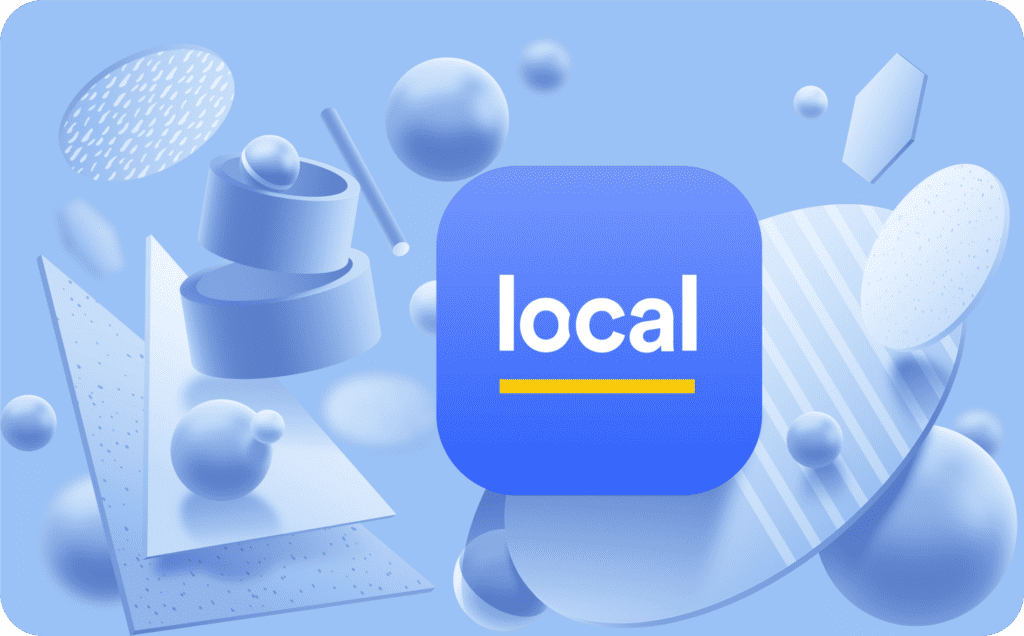
Known for its comprehensive listing services, LocalSearch is considered one of the best free online business directories that caters specifically to Australia. It offers a user-friendly interface and a range of tools to enhance business visibility.
2. TrueLocal
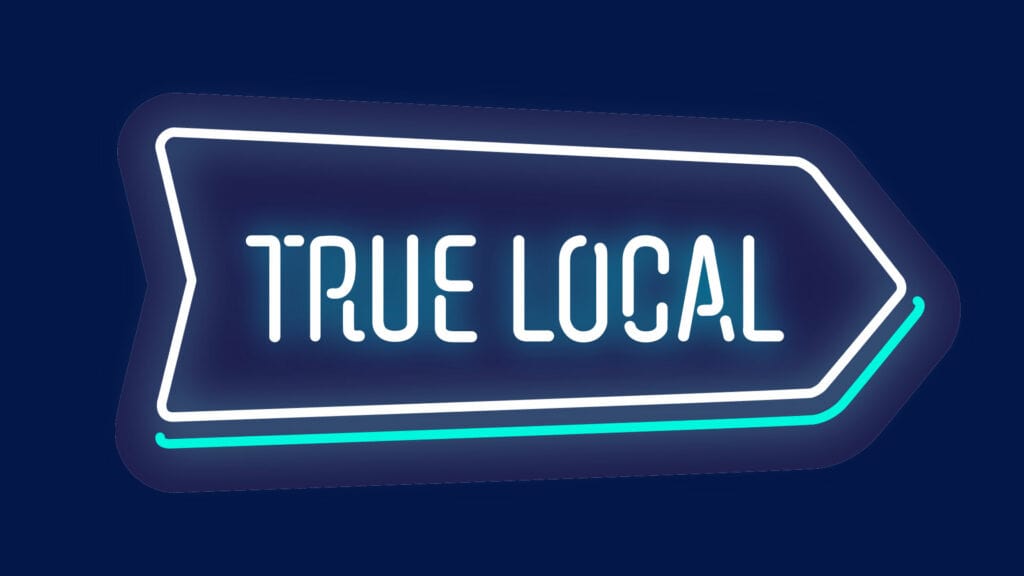
This directory stands out for its focus on local businesses and communities. TrueLocal provides a platform for Australian businesses to connect with local customers, showcasing reviews and ratings that help build trust and credibility.
3. AussieWeb
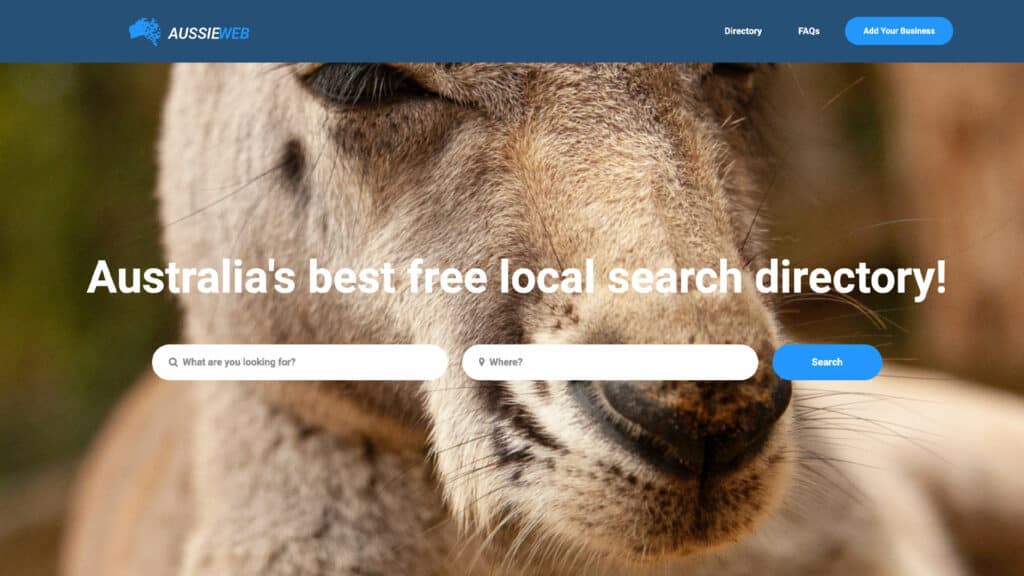
Offering a simple yet effective platform, AussieWeb makes it easy for businesses to list their services and for customers to find them. Its straightforward approach is particularly beneficial for small businesses starting their online journey.
4. Hotfrog
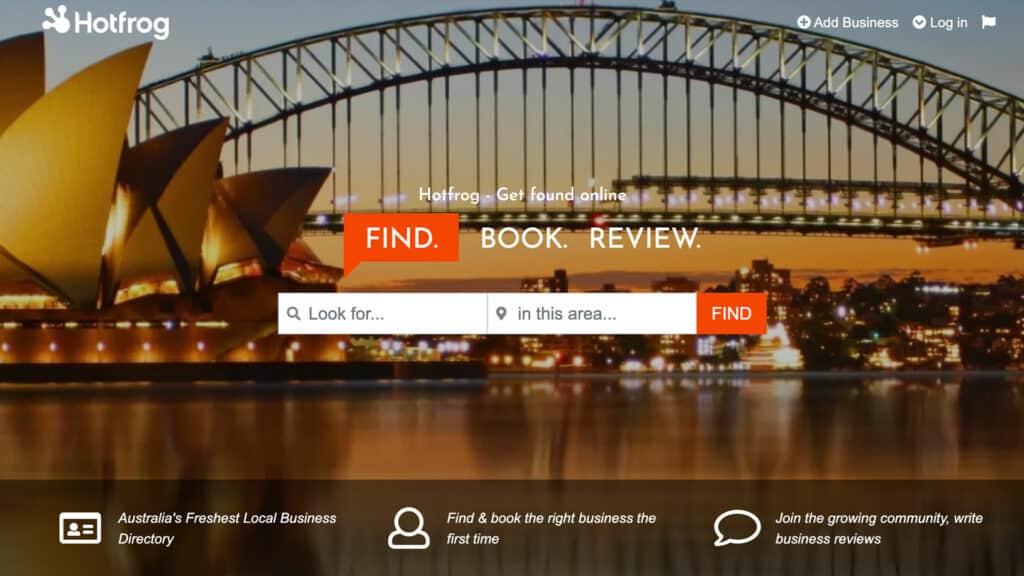
Distinguished for its categorisation and search features, Hotfrog helps businesses target specific markets and customer segments. It's an excellent tool for businesses looking to enhance their niche marketing strategies.
5. StartLocal
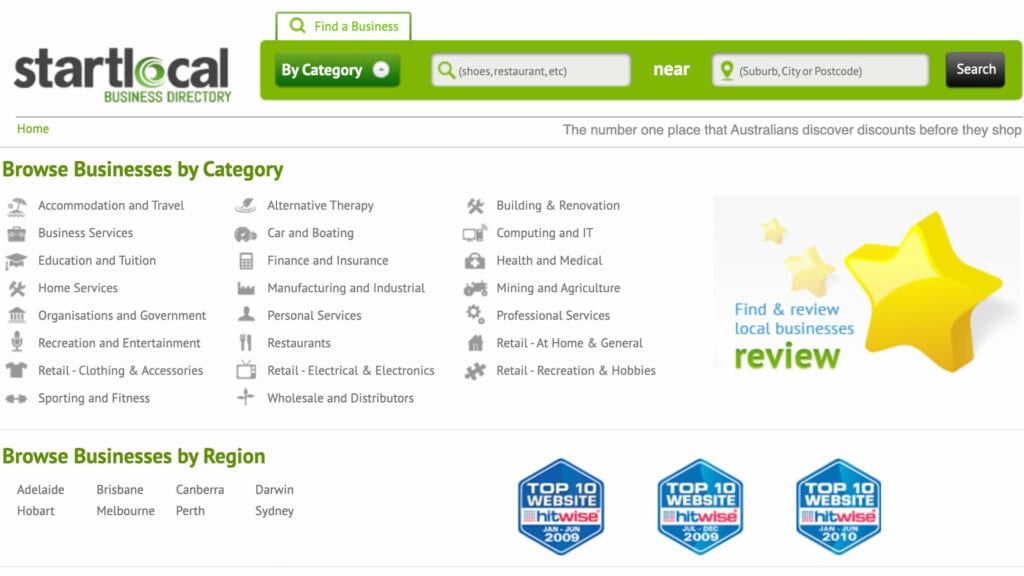
This directory is appreciated for its user-friendly design and effectiveness in connecting businesses with local customers. StartLocal also provides valuable insights into customer trends and preferences.
6. SavvySME
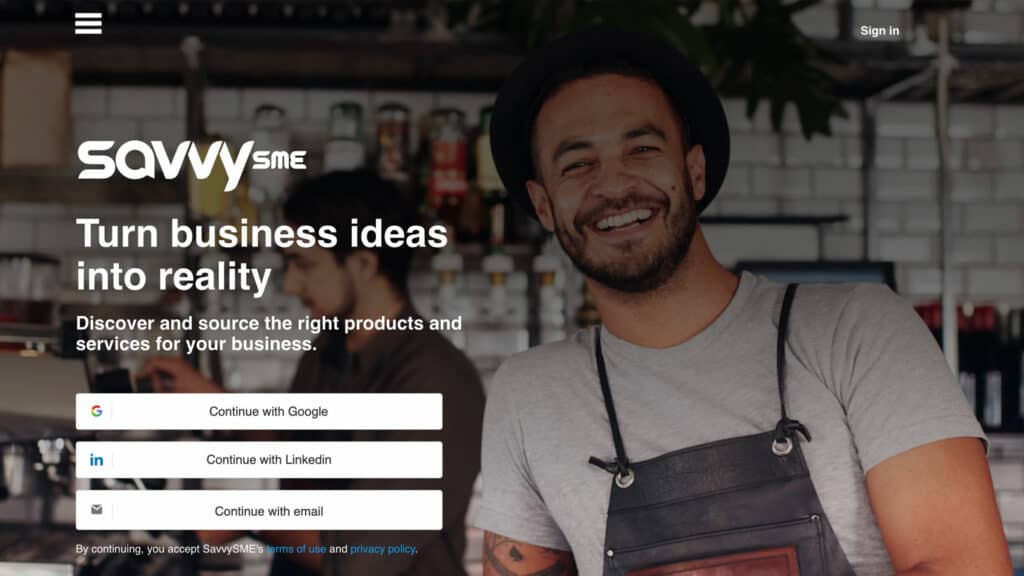
Tailored for small and medium enterprises, SavvySME offers a community-oriented platform. It not only lists businesses but also fosters connections and collaborations among business owners.
7. Yellow Pages
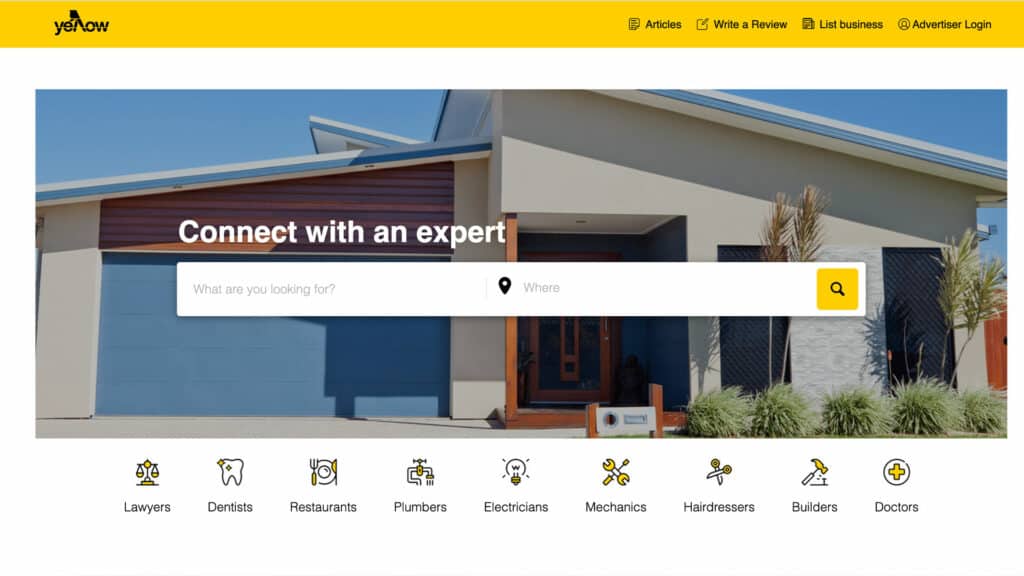
A legacy in the world of the best free online business directories, Yellow Pages has successfully transitioned to the digital realm. It remains a trusted source for customers looking for reliable business listings.
8. Oneflare
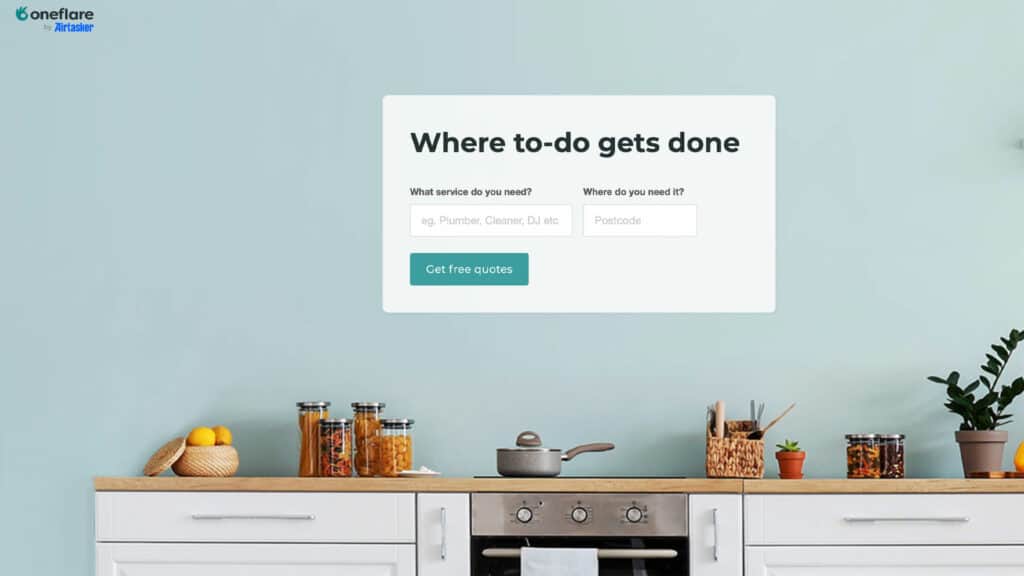
This platform is unique for its focus on service-based businesses. Oneflare connects customers with local service providers, from plumbers to photographers, facilitating a smooth transaction process.
9. Flying Solo
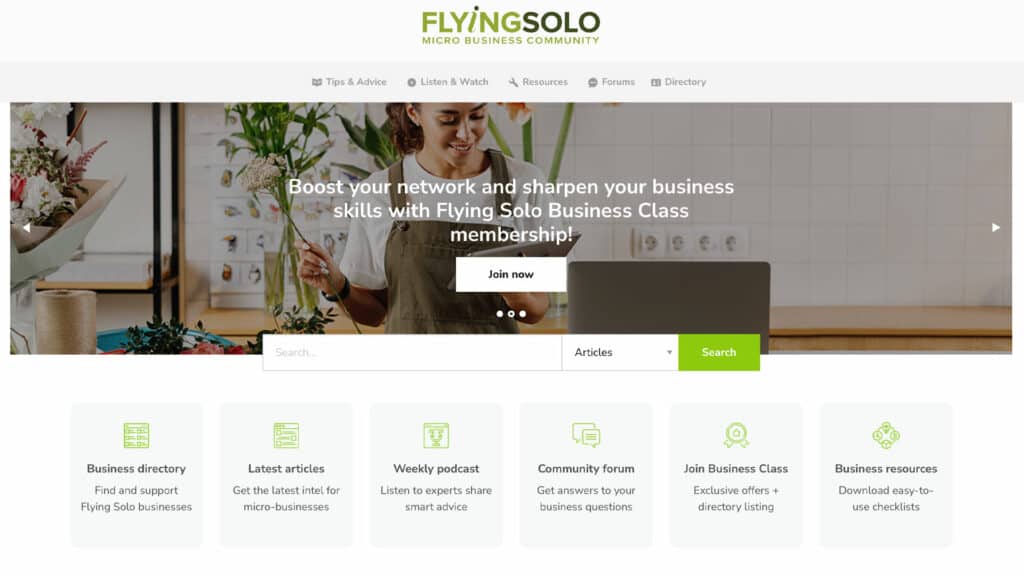
As the name suggests, this directory is dedicated to solo entrepreneurs and freelancers. Flying Solo offers a niche platform for independent professionals to showcase their services.
10. Word of Mouth
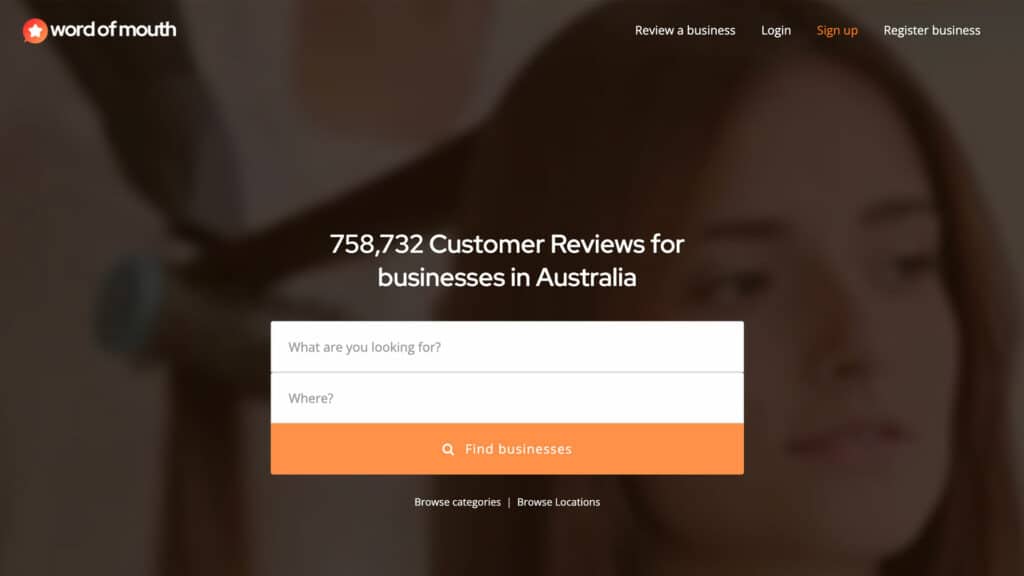
Leveraging the power of customer reviews, this directory helps businesses build their reputation based on genuine customer feedback. It's an excellent tool for businesses aiming to establish trust and authenticity.
11. Yelp
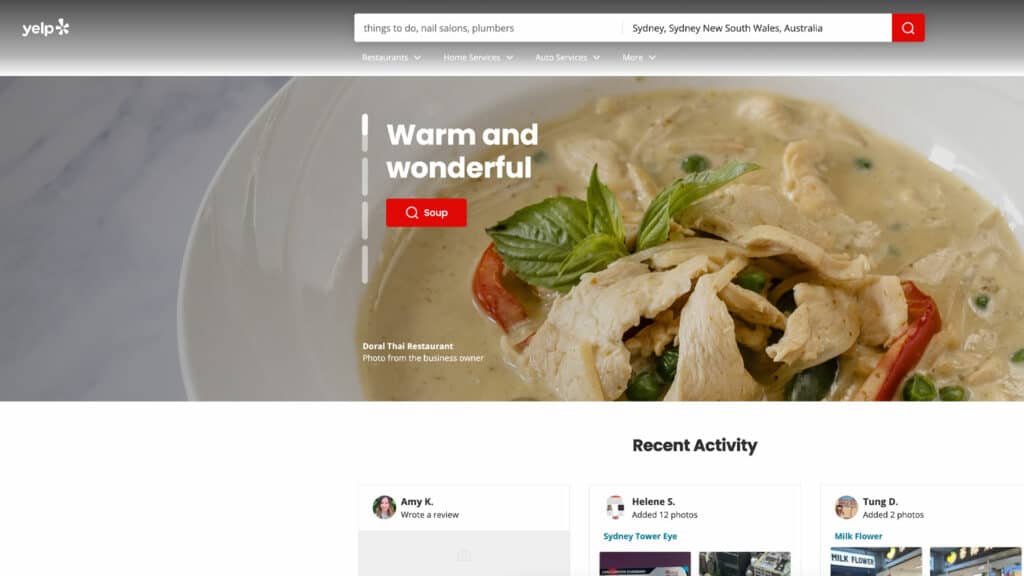
Yelp Australia is one of the country's largest directories, with over 1.5 million monthly visits. A large part of Yelp's success stems from its review function, which may be quite beneficial to prospective customers. It may be used to search for and get information on everything, from restaurants and nightclubs to physicians, since the Australian version was established in 2011.
12. White Pages
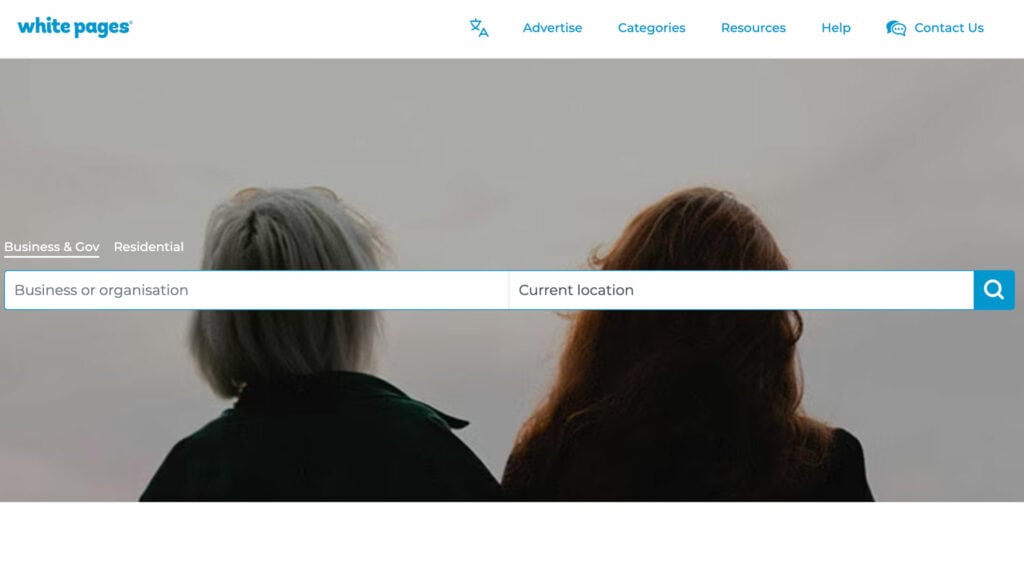
White Pages is one of Australia's most reputable business directories, listing not just companies but also individuals and other government agencies.
13. Search Frog
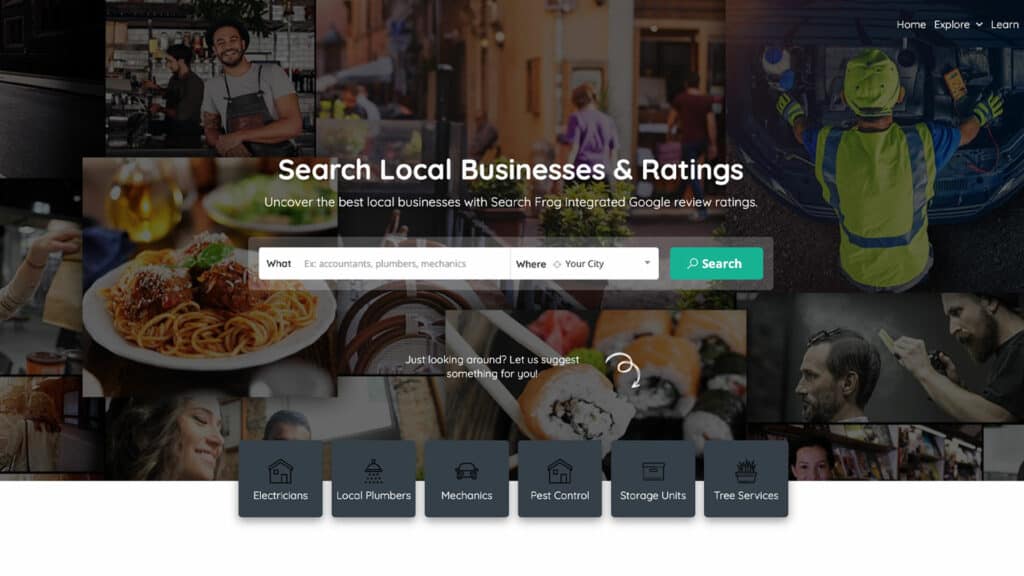
Search Frog is a high-quality company directory that is distinguished by a number of distinctive characteristics. To begin, they have an onsite blog designed to entice early purchasers, which is unusual for company listing sites. They monitor calls and referrals, integrate Google reviews, and manually verify listings to provide the greatest customer experience.
14. Local
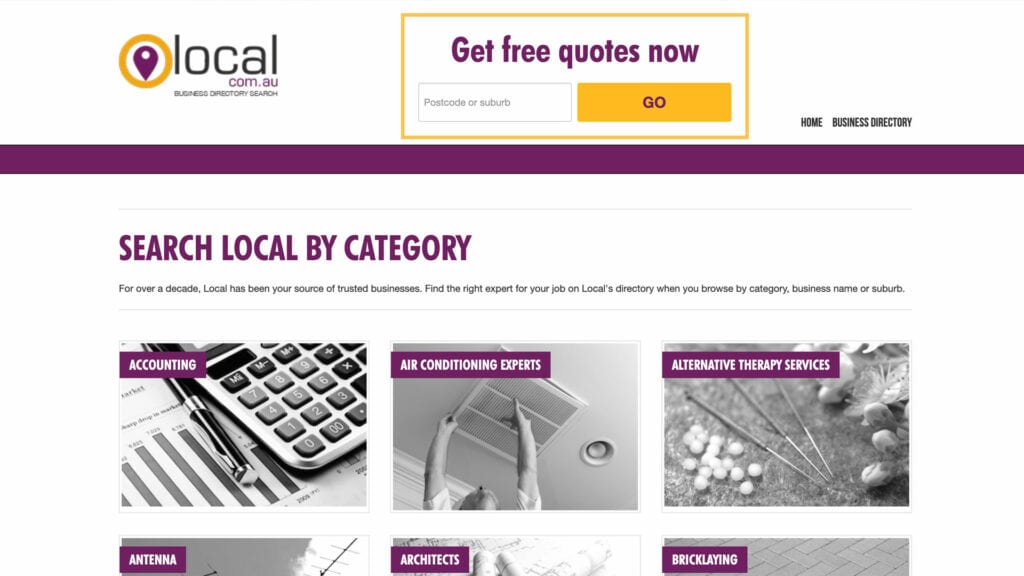
For almost two decades, Local.com.au has been an active business directory. They were one of Australia's earliest online-focused business directories.
15. PureLocal

The Pure Local Business Directory of Australia is a trusted resource for consumers seeking reliable information about local companies. It features transparent company profiles with detailed descriptions, contact information, website links, videos, and reviews.
Maximising Your Directory Presence

To make the most out of these directories, businesses should ensure their listings are complete, accurate, and engaging. Including detailed descriptions, up-to-date contact information, and high-quality images can significantly impact visibility and customer attraction. Avoid common pitfalls like neglecting to update listings or failing to respond to customer reviews.
The Evolving Landscape of Business Directories

The future of the best free online business directories in Australia looks promising, with advancements in technology and increased digital literacy among consumers. These directories are expected to become more integrated with social media and other digital marketing tools, offering businesses even more avenues to reach their target audience.
Final Thoughts
The best free online business directories listed above offer valuable platforms for Australian businesses to increase their online visibility and connect with potential customers. Businesses can significantly enhance their market presence and drive growth by strategically utilising these directories.

In the realm of online transactions, PayPal has long been a dominant player. As a pioneer in the digital payments industry, it has provided businesses and individuals worldwide with a convenient and user-friendly platform for sending and receiving money. For many Australian businesses, PayPal has been the go-to solution for handling online transactions, offering a secure and globally recognised payment method.
However, as the digital landscape continues to evolve, so do the needs and preferences of businesses. A growing number of Australian businesses are seeking a PayPal alternative for a variety of reasons. Some are in search of lower transaction fees, others desire more tailored customer service, and still others require features that are not offered by PayPal. Additionally, the need for diversification in payment methods, both to increase customer convenience and to mitigate risks associated with relying on a single payment platform, is driving the exploration of other options.
Understanding the various payment options available for online transactions is crucial for businesses in today's digital age. It allows businesses to choose the platform that best aligns with their needs, potentially leading to cost savings, improved customer satisfaction, and enhanced operational efficiency.
In this article, we will delve into the world of PayPal alternatives, focusing specifically on options that are well-suited for Australian businesses. Whether you're a small business owner just starting your online journey or a seasoned e-commerce professional looking for better payment solutions, this guide aims to provide you with valuable insights to help you make an informed decision.
Table of Contents
PayPal Alternatives for Australian Businesses
While PayPal has a strong presence in the online payment ecosystem, it's far from the only player. A number of other platforms offer similar services, and some of these may be better suited to the specific needs of Australian businesses. Let's take a look at some of these alternatives.
1. Stripe
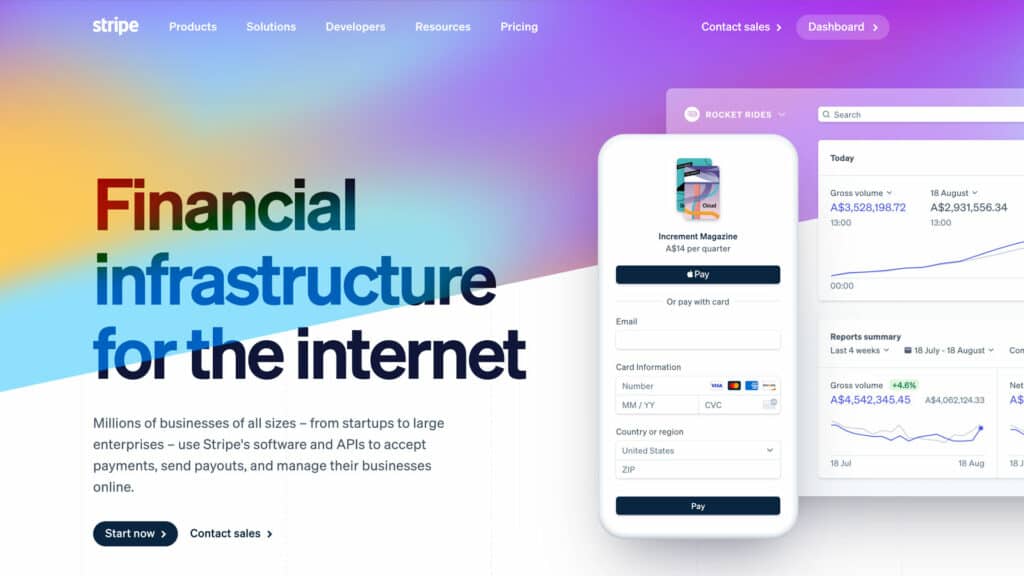
Stripe is a comprehensive payments platform designed for online businesses, offering a suite of payment APIs that allow businesses to accept and manage online transactions. Stripe is known for its flexibility, robust feature set, and developer-friendly tools and is a great PayPal alternative for freelancers.
How It Works
Businesses can integrate Stripe into their websites or apps using the platform's APIs. Once integrated, Stripe provides a secure way to accept and process a variety of payment methods, including credit and debit cards, digital wallets, and local payment options.
Fees
Stripe charges a fee of 1.75% + 30¢ for domestic cards and 2.9% + 30¢ for international cards and digital wallets for Australian businesses. There are no setup fees, monthly fees, or hidden costs. However, fees can vary, so it's always a good idea to check the most current rates on the Stripe website.
Unique Features
Stripe's standout features include its highly customisable APIs, which allow businesses to create tailored payment experiences. Stripe also offers advanced reporting and analytics tools, built-in fraud protection, and support for subscription and recurring payments.
Suitability for Australian Businesses
Stripe's wide range of features and customisable APIs make it a versatile choice for Australian businesses of all sizes. Its support for a variety of payment methods and currencies can be particularly beneficial for businesses that operate internationally.
Comparison with PayPal
While both Stripe and PayPal offer a wide range of features for online businesses, Stripe stands out for its customisability and developer-friendly tools. However, Stripe's per-transaction fees can be higher than PayPal's for certain types of transactions. Unlike PayPal, Stripe does not offer a ready-made payment button, so some technical setup is required.
2. Square
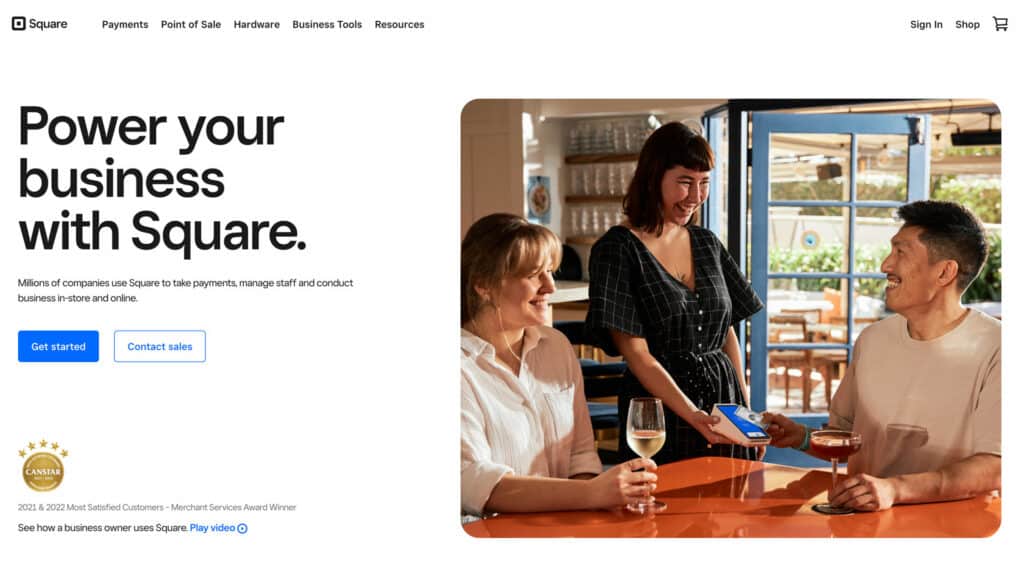
Square is a comprehensive payment solution that provides a range of services, including point-of-sale systems, online payments, and mobile payment processing. Square is known for its user-friendly interface, transparent pricing, and robust suite of business tools.
How It Works
Businesses can use Square to accept payments in a variety of ways. Square provides hardware for accepting in-person payments, and businesses can also integrate Square into their websites or apps to accept online payments. Square's system is designed to be simple and easy to use, with no long-term contracts or hidden fees.
Fees
Square charges a fee of 1.9% for card-present transactions and 2.2% for online, card-not-present transactions for Australian businesses. There are no setup fees, monthly fees, or hidden costs. However, fees can vary, so it's always a good idea to check the most current rates on the Square website.
Unique Features
Square's standout features include its point-of-sale systems, which can be a significant advantage for businesses that operate both online and in-person. Square also offers a range of additional business tools, including inventory management, customer directories, and sales reports.
Suitability for Australian Businesses
Square's wide range of features and transparent pricing make it a versatile choice for Australian businesses of all sizes. Its support for both online and in-person payments can be particularly beneficial for businesses that operate in multiple channels.
Comparison with PayPal
While both Square and PayPal offer a wide range of features for online businesses, Square stands out for its point-of-sale systems and additional business tools. However, Square's fees for online transactions can be higher than PayPal's, and it does not offer a digital wallet like PayPal does.
3. Zip
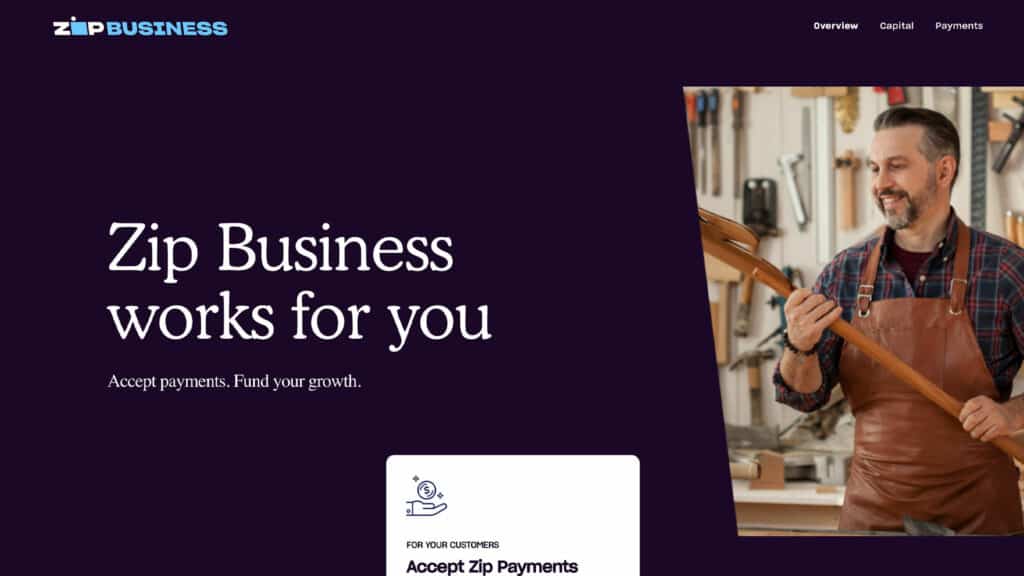
Zip, formerly known as ZipPay, is a buy now, pay later service that allows customers to make purchases now and pay for them over time. Zip is known for its flexible repayment options and interest-free terms.
How It Works
Businesses can integrate Zip into their online checkout process. Once integrated, customers can choose Zip as their payment method at checkout. Zip pays the business upfront for the purchase, and the customer repays Zip according to their chosen repayment schedule.
Fees
Zip charges businesses a merchant fee for each transaction. The exact fee can vary based on the business's volume of sales. There are no setup fees or monthly fees. However, fees can vary, so it's always a good idea to check the most current rates on the Zip website.
Unique Features
Zip's standout feature is its buy now, pay later service, which offers customers flexibility in how they repay their purchases. This can be a significant advantage for businesses that sell higher-priced items.
Suitability for Australian Businesses
Zip's popularity among consumers and its ability to boost conversion rates and average order values can make it a good choice for Australian businesses. However, its merchant fees can be higher than some other payment options.
Comparison with PayPal
While both Zip and PayPal offer a wide range of features for online businesses, Zip stands out for its buy now, pay later service. However, Zip's merchant fees can be higher than PayPal's, and it does not offer a digital wallet or the ability to accept payments from PayPal accounts.
4. SecurePay
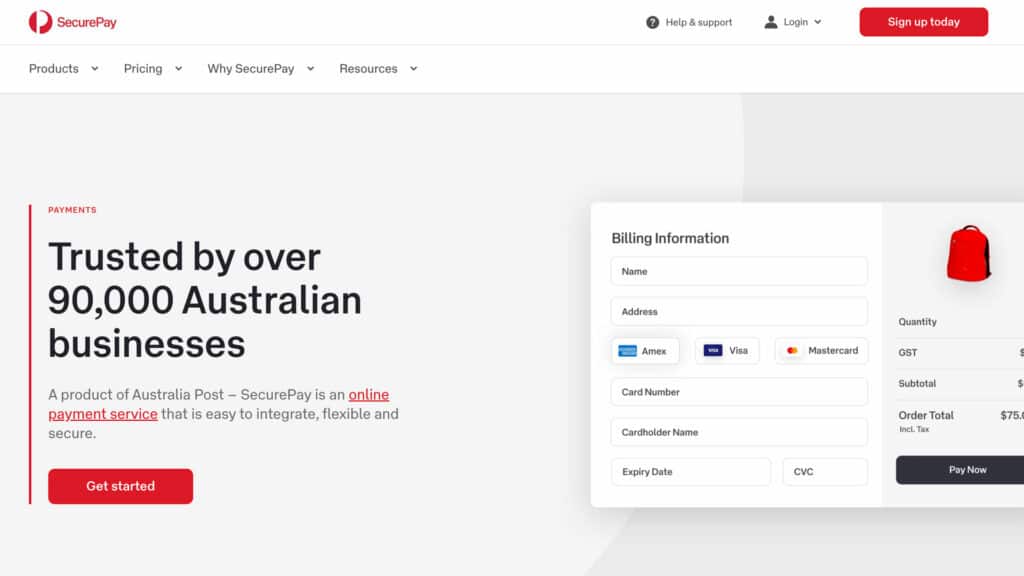
SecurePay, a business of Australia Post, is a premium online payment gateway for Australian businesses. It offers a range of solutions designed to make accepting payments online quick, easy, and secure. SecurePay is known for its robust security features and integration with a wide range of e-commerce platforms and is a great PayPal alternative for business.
How It Works
Businesses can integrate SecurePay into their websites or apps using the platform's APIs. Once integrated, SecurePay provides a secure way to accept and process a variety of payment methods, including credit and debit cards. SecurePay also offers a virtual terminal for processing phone orders.
Fees
SecurePay charges a flat fee of 2.4% per transaction for Australian businesses. There are no setup fees or monthly fees. However, fees can vary, so it's always a good idea to check the most current rates on the SecurePay website.
Unique Features
SecurePay's standout features include its robust security measures, which include fraud prevention tools and full compliance with the Payment Card Industry Data Security Standard (PCI DSS). SecurePay also offers detailed reporting and analytics tools.
Suitability for Australian Businesses
SecurePay's strong security features, competitive pricing, and wide range of features make it a strong choice for Australian businesses of all sizes. Its support for a variety of payment methods and integration with many popular e-commerce platforms add to its appeal.
Comparison with PayPal
While both SecurePay and PayPal offer a wide range of features for online businesses, SecurePay stands out for its robust security measures and competitive pricing. However, unlike PayPal, SecurePay does not offer a digital wallet or the ability to accept payments from PayPal accounts.
5. Payoneer
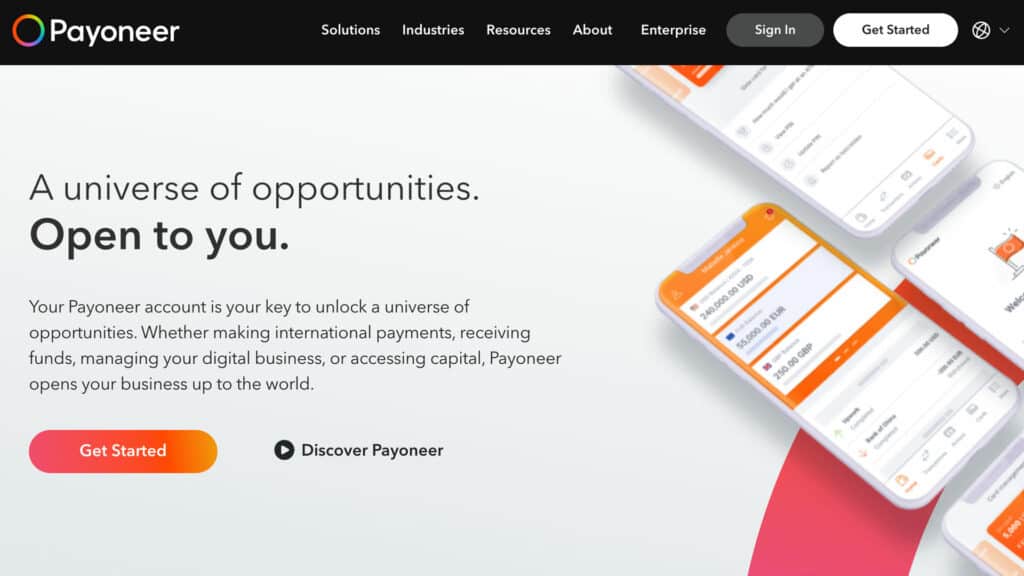
Payoneer is a financial services company that provides online money transfer, digital payment services, and provides customers with working capital. It's known for its cross-border payments platform and currency conversion services.
How It Works
Businesses can use Payoneer to receive payments from customers, marketplaces, and clients worldwide. Once a payment is received, it can be withdrawn to a bank account or used to make payments to other Payoneer users. Payoneer also offers a Mastercard that can be used to make purchases or withdraw cash from ATMs.
Fees
Payoneer charges a 1% fee to receive payments from other Payoneer customers. Fees for receiving payments from marketplaces and clients can vary, and there may also be fees for currency conversion and ATM withdrawals. It's always a good idea to check the most current rates on the Payoneer website.
Unique Features
Payoneer's standout features include its strong support for international transactions, including support for multiple currencies and local bank transfers in over 150 countries. Payoneer also offers value-added services like tax form assistance and working capital funding.
Suitability for Australian Businesses
Payoneer's strong support for international transactions can make it a good choice for Australian businesses that operate internationally. However, its fees for certain types of transactions can be higher than some other options.
Comparison with PayPal
While both Payoneer and PayPal offer a wide range of features for online businesses, Payoneer stands out for its strong support for international transactions and value-added services. However, Payoneer's fees for certain types of transactions can be higher than PayPal's, and it may not be as widely recognised or accepted as PayPal.
6. Skrill
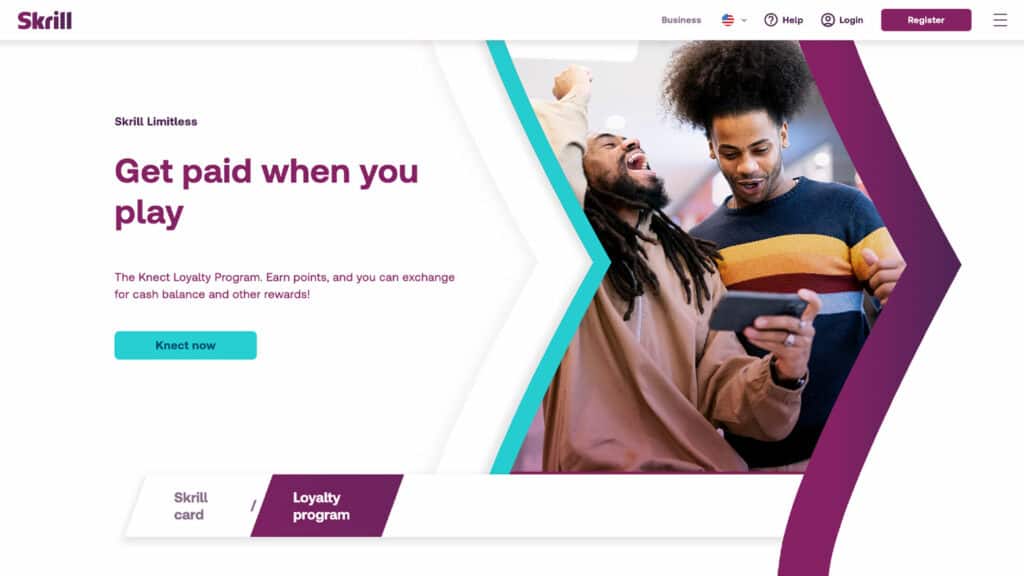
Skrill is a digital wallet provider and online payment service that allows businesses and individuals to make payments and money transfers over the internet. Skrill is known for its simplicity, security, and international money transfer capabilities.
How It Works
Businesses can integrate Skrill into their websites or apps to accept payments from customers. Once integrated, Skrill provides a secure way to accept and process a variety of payment methods, including credit and debit cards, bank transfers, and payments from Skrill digital wallets.
Fees
Skrill charges a fee of 1.9% + $0.29 per transaction for Australian businesses. There may also be fees for currency conversion and international transfers. However, fees can vary, so it's always a good idea to check the most current rates on the Skrill website.
Unique Features
Skrill's standout features include its digital wallet, which allows customers to make payments and transfers without sharing their financial details. Skrill also offers a prepaid Mastercard, which can be used to access funds in the Skrill account.
Suitability for Australian Businesses
Skrill's digital wallet and international transfer capabilities can make it a good choice for Australian businesses that operate internationally. However, its fees for certain types of transactions can be higher than some other options.
Comparison with PayPal
While both Skrill and PayPal offer a wide range of features for online businesses, Skrill stands out for its digital wallet and prepaid Mastercard. However, Skrill's fees for certain types of transactions can be higher than PayPal's, and it may not be as widely recognised or accepted as PayPal.
7. Google Pay
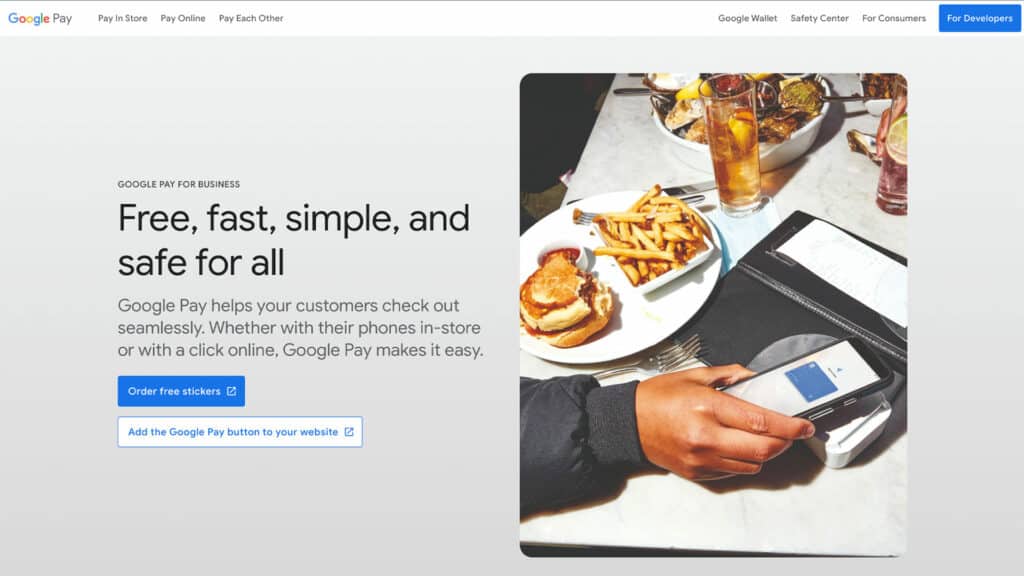
Google Pay is a digital wallet platform and online payment system developed by Google. It allows users to make payments with smartphones, tablets, or watches. Google Pay is known for its simplicity, security, and integration with other Google services.
How It Works
Businesses can integrate Google Pay into their websites or apps to accept payments from customers. Once integrated, customers can choose to pay with Google Pay at checkout. The payment is then transferred from the customer's Google Pay account to the business's account.
Fees
Google Pay does not charge fees for using the service. However, if businesses are using a payment gateway or merchant account to process payments, those services may charge their own fees.
Unique Features
Google Pay's standout features include its integration with other Google services and its strong security measures, which include tokenisation of card information. Google Pay also supports in-store payments via NFC and online payments in apps and on websites.
Suitability for Australian Businesses
Google Pay's wide range of features and strong security measures make it a good choice for Australian businesses of all sizes. Its support for both online and in-store payments can be particularly beneficial for businesses that operate in multiple channels.
Comparison with PayPal
While both Google Pay and PayPal offer a wide range of features for online businesses, Google Pay stands out for its integration with other Google services and its support for in-store payments. However, unlike PayPal, Google Pay does not offer a digital wallet where users can store money.
8. AfterPay
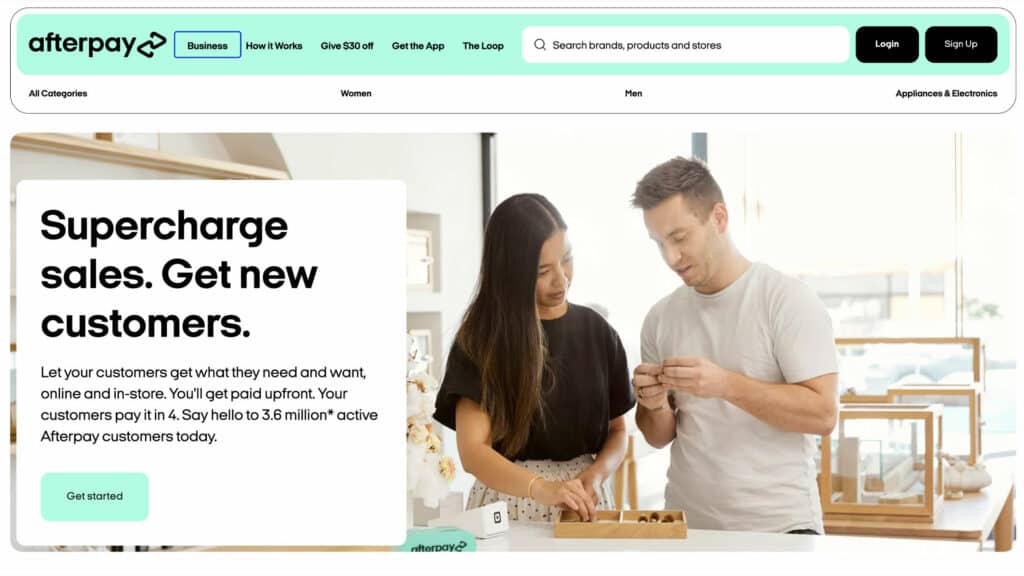
AfterPay is a buy now, pay later service that allows customers to purchase products immediately and pay for them in four equal installments, due every two weeks. AfterPay is known for its interest-free installment plans and wide acceptance among retailers.
How It Works
Businesses can integrate AfterPay into their online checkout process. Once integrated, customers can choose AfterPay as their payment method at checkout. AfterPay pays the business upfront for the purchase, and the customer repays AfterPay in installments.
Fees
AfterPay charges businesses a fixed transaction fee and a commission that varies based on the business's volume of sales. There are no setup fees or monthly fees. However, fees can vary, so it's always a good idea to check the most current rates on the AfterPay website.
Unique Features
AfterPay's standout feature is its buy now, pay later service, which allows customers to spread the cost of their purchases over several payments. This can be a significant advantage for businesses that sell higher-priced items.
Suitability for Australian Businesses
AfterPay's popularity among consumers and its ability to boost conversion rates and average order values can make it a good choice for Australian businesses. However, its fees can be higher than some other payment options.
Comparison with PayPal
While both AfterPay and PayPal offer a wide range of features for online businesses, AfterPay stands out for its buy now, pay later service. However, AfterPay's fees for businesses can be higher than PayPal's, and it does not offer a digital wallet or the ability to accept payments from PayPal accounts.
9. Wise
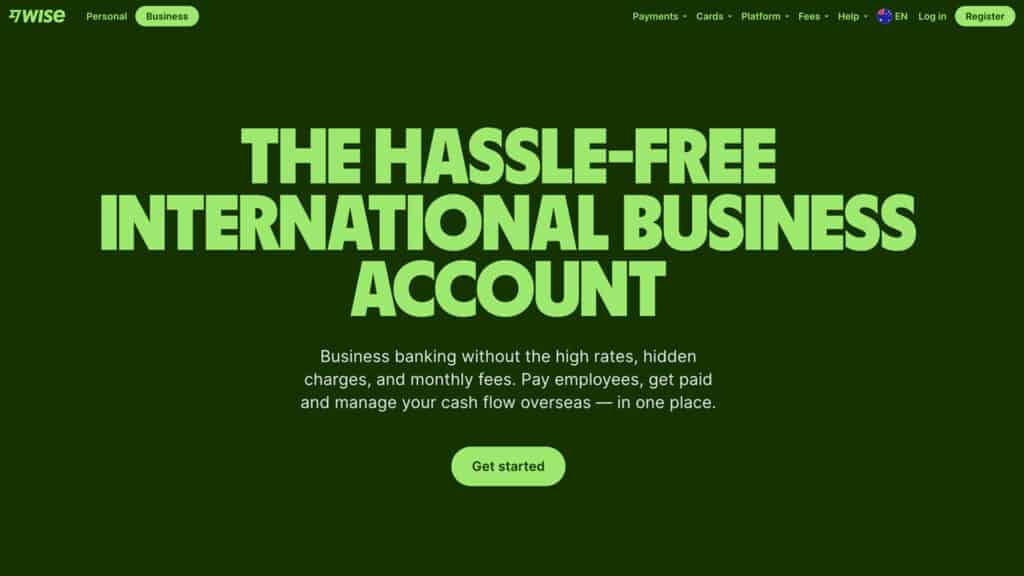
Wise is a financial technology company that provides international money transfer services. It's known for its transparency, low fees, and the use of the real exchange rate (the mid-market rate) for currency conversion.
How It Works
Businesses can use Wise to send and receive money internationally, hold money in multiple currencies, and get local bank details for multiple countries. This can be particularly useful for businesses that have customers, suppliers, or employees in different countries.
Fees
Wise charges a small, upfront fee for international transfers. The fee is typically a percentage of the transfer amount, and it varies based on the currencies involved and the payment method. There are no setup fees or monthly fees. However, fees can vary, so it's always a good idea to check the most current rates on the Wise website.
Unique Features
Wise's standout features include its use of the real exchange rate for currency conversion, which can result in significant savings compared to traditional banks and other payment services. Wise also offers a multi-currency account that allows businesses to hold and manage money in multiple currencies.
Suitability for Australian Businesses
Wise's low fees and multi-currency features can make it a good choice for Australian businesses that operate internationally. However, Wise is not a full-service bank, and it does not offer some services that businesses may need, such as business loans or merchant services.
Comparison with PayPal
While both Wise and PayPal offer a wide range of features for online businesses, Wise stands out for its low fees and multi-currency features. However, unlike PayPal, Wise does not offer a digital wallet or the ability to accept payments from customers directly.
10. Braintree
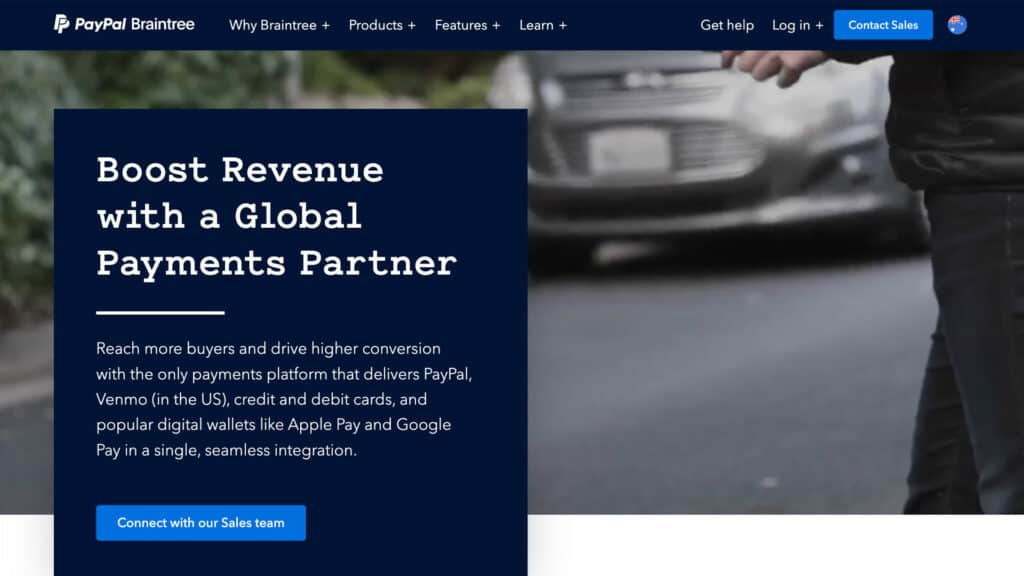
Braintree is a full-stack payments platform that is part of the PayPal family. It provides businesses with the ability to accept payments in multiple currencies and through various payment methods, including credit and debit cards, digital wallets, and PayPal itself. Braintree is known for its robust, customisable payment experiences and excellent security features.
How It Works
Businesses can integrate Braintree into their websites or apps using the platform's APIs. Once integrated, Braintree provides a secure way to collect and process payment information. The platform handles tasks like payment encryption and fraud prevention, allowing businesses to focus on their core operations.
Fees
Braintree charges a standard fee of 1.75% + $0.30 AUD for domestic Australian cards, and a 2.9% + $0.30 AUD fee for American Express, international cards, and digital wallets. There are no monthly fees, minimums, or setup fees. However, fees can vary, so it's always a good idea to check the most current rates on the Braintree website.
Unique Features
One of Braintree's standout features is its advanced fraud protection tools, which use machine learning to help businesses detect and prevent fraudulent transactions. Braintree also offers detailed reporting and analytics tools, and its APIs are highly customisable, allowing businesses to create a payment experience that fits their specific needs.
Suitability for Australian Businesses
Braintree's ability to accept a wide range of payment methods and currencies makes it a good fit for Australian businesses that operate internationally. Its advanced fraud protection tools can also be a significant advantage for businesses that are concerned about online fraud.
Comparison with PayPal
While Braintree is part of the PayPal family, it offers a different set of features. Unlike PayPal, which provides a ready-made payment solution, Braintree offers a more customisable platform that businesses can integrate directly into their own websites or apps. However, Braintree's fees for certain transactions can be higher than PayPal's standard fees.
11. Eway
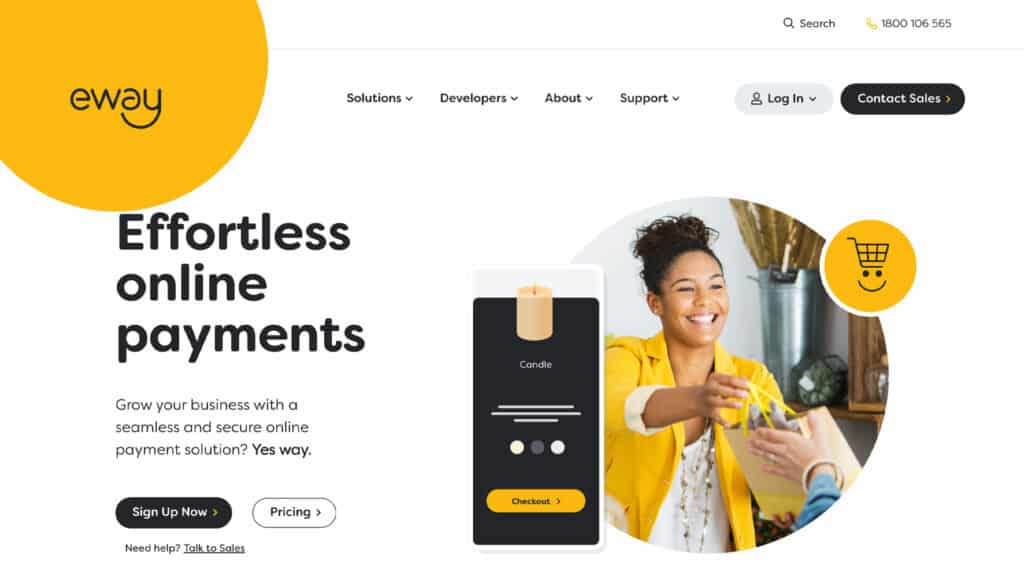
Eway is a leading payment gateway provider in Australia. It offers a secure and reliable platform for businesses to accept online payments. Eway is known for its straightforward setup, local customer support, and integration with a wide range of e-commerce platforms.
How It Works
Businesses can integrate Eway into their websites or apps using the platform's APIs. Once integrated, Eway provides a secure way to accept and process a variety of payment methods, including credit and debit cards. Eway also offers a virtual terminal for processing phone orders.
Fees
Eway charges a flat fee of 1.5% + 25¢ per transaction for Australian businesses. There are no setup fees or monthly fees. However, fees can vary, so it's always a good idea to check the most current rates on the Eway website.
Unique Features
Eway's standout features include its local customer support, which can be a significant advantage for businesses that value accessible and responsive service. Eway also offers a range of fraud prevention tools and supports recurring payments and pre-authorisations.
Suitability for Australian Businesses
Eway's local presence, competitive pricing, and wide range of features make it a strong choice for Australian businesses of all sizes. Its support for a variety of payment methods and integration with many popular e-commerce platforms add to its appeal.
Comparison with PayPal
While both Eway and PayPal offer a wide range of features for online businesses, Eway stands out for its local customer support and competitive pricing. However, unlike PayPal, Eway does not offer a digital wallet or the ability to accept payments from PayPal accounts.
The Pros and Cons of PayPal for Australian Businesses

Before we delve into the alternatives, let's first take a closer look at PayPal itself. Understanding how PayPal works and its specific advantages and disadvantages for Australian businesses will provide a solid foundation for evaluating other options.
How PayPal Works for Australian Businesses
PayPal operates as an online payment system that supports online money transfers. It serves as an electronic alternative to traditional paper methods like checks and money orders. For businesses, PayPal offers a secure platform for accepting payments from customers, both domestically and internationally.
Australian businesses can use PayPal to accept payments in multiple currencies, making it easier to sell products or services to customers around the world. Payments can be accepted through a website, over the phone, or in person using a mobile card reader. Once a payment is received, the funds can be transferred to a linked bank account or used to make purchases or pay invoices directly from the PayPal account.
Advantages of Using PayPal
PayPal offers several advantages for businesses. Its global recognition and trust can help increase conversion rates, as customers are often more comfortable paying through a platform they know and trust. PayPal also offers seller protection on eligible sales, and its ability to handle international payments can help businesses reach a global customer base.
For Australian businesses, PayPal's integration with popular e-commerce platforms like Shopify and WooCommerce can simplify the process of setting up online payments. PayPal's reporting and analytics tools can also provide valuable insights into sales trends and customer behavior.
Potential Drawbacks of Using PayPal
Despite its advantages, PayPal may not be the perfect fit for every business. One of the main drawbacks of PayPal is its fees. PayPal charges a percentage of the transaction amount plus a fixed fee for each sale. While these fees are competitive, they can add up, particularly for businesses with high sales volumes.
Another potential issue is that PayPal can freeze accounts if it detects suspicious activity. While this is part of PayPal's efforts to prevent fraud, it can cause issues for businesses if there are misunderstandings or errors.
Finally, some businesses and customers have reported customer service issues with PayPal. While many users have positive experiences, others have reported difficulties resolving issues or getting timely responses to queries.
How to Choose the Right PayPal Alternative

Choosing the right PayPal alternative for your Australian business is a critical decision that can significantly impact your operations, customer satisfaction, and bottom line. Here are some factors to consider and tips for making the switch.
Factors to Consider When Choosing a PayPal Alternative
- Fees: The cost of using a payment platform can vary widely. Consider not only transaction fees but also any setup fees, monthly fees, currency conversion fees, and other costs. Remember, the cheapest option may not always be the best one if it doesn't meet your other needs.
- Ease of Use: A payment platform should be easy for both you and your customers to use. Look for a user-friendly interface, straightforward setup and integration, and simple processes for making and receiving payments.
- Customer Service: Good customer service can be invaluable when you're dealing with financial transactions. Look for a provider with a strong reputation for customer support, including fast response times and knowledgeable service representatives.
- Integration with Other Systems: If you're using other business software (like accounting software, CRM systems, or e-commerce platforms), it can be beneficial to choose a payment platform that integrates seamlessly with these systems. This can help streamline your operations and reduce administrative work.
Tips for Making the Switch to a PayPal Alternative
- Do Your Research: Before you make a switch, spend some time researching different PayPal alternatives. Consider your specific needs, and look for a solution that meets these needs. Read reviews, check out their websites, and don't hesitate to contact them with any questions.
- Plan for a Transition Period: Switching payment platforms can take some time, especially if you need to integrate the new platform with your website or other business systems. Plan for this transition period and make sure you have the resources in place to manage it effectively.
- Communicate with Your Customers: If you're changing the way you accept payments, it's important to communicate this change to your customers. Let them know about the new payment options and any benefits they might offer, such as additional payment methods or improved security.
- Test Everything: Before you fully switch over to a new payment platform, make sure to test everything thoroughly. This includes making and receiving payments, refunding transactions, and anything else you'll need to do as part of your business operations.
Remember, the right payment platform for your business is the one that best meets your unique needs. By considering all your options and carefully planning your switch, you can find a PayPal alternative that offers the features, pricing, and performance that your Australian business needs.
Final Thoughts
Navigating the world of online payments can be a complex task, but it's an essential one in today's digital age. For Australian businesses, PayPal has long been a trusted and reliable option, offering a range of features that facilitate easy online transactions. However, as we've explored in this article, there are numerous PayPal alternatives that may better suit your specific needs.
From the simplicity and security of Google Pay to the buy now, pay later model of AfterPay and Zip, the flexibility of Wise's multi-currency features, and the robust point-of-sale systems offered by Square, there's a wealth of options available. Each comes with its own unique set of features, fees, and benefits, making it crucial to consider your business's specific requirements when choosing a payment platform.
Remember, factors such as fees, ease of use, customer service, and integration with other systems should all play a part in your decision-making process. And when you're ready to make the switch, careful planning, clear communication with customers, and thorough testing can help ensure a smooth transition.
In conclusion, the importance of choosing the right payment system for your business cannot be overstated. The right platform can streamline your operations, improve customer satisfaction, and even boost your bottom line. So take the time to explore your options, weigh the pros and cons, and make the choice that's right for your Australian business. In the ever-evolving landscape of digital commerce, staying adaptable and choosing the most fitting tools for your business are key to staying ahead.
Afterpay charges merchants a $0.30 flat fee plus 4-6% of each sale.
In the ever-evolving world of e-commerce, businesses are constantly seeking innovative ways to enhance customer experience and boost sales. One such innovation that has gained significant traction in recent years is Afterpay, a buy now, pay later (BNPL) service that allows customers to purchase products immediately and pay for them in four equal installments, interest-free.
While Afterpay offers clear benefits to customers, providing them with increased purchasing power and financial flexibility, it also presents unique advantages for merchants. These include increased conversion rates, higher average order values, and access to a broader customer base. However, like all services, Afterpay comes with its own costs, most notably in the form of merchant fees.
Understanding Afterpay's merchant fees is crucial for businesses considering this payment option. These fees, which are charged to the merchant for each transaction made through Afterpay, can have a significant impact on a business's bottom line. This article aims to provide a comprehensive overview of Afterpay merchant fees, helping businesses make informed decisions about whether this popular BNPL service is the right fit for their operations.
Stay with us as we delve into the intricacies of Afterpay's fee structure, compare it with other similar services, and provide practical strategies for businesses to mitigate the impact of these fees. Whether you're a small business owner considering Afterpay for the first time or a seasoned merchant looking to optimize your use of the service, this guide is designed to equip you with the knowledge you need to navigate the landscape of Afterpay merchant fees effectively.
Table of Contents
Unpacking the Benefits of Afterpay

In order to fully grasp the implications of Afterpay merchant fees, it's essential to first understand how Afterpay works and the benefits it offers to both customers and merchants.
How Does Afterpay Work?
Afterpay is a buy now, pay later (BNPL) service that allows customers to make purchases immediately and pay for them in four equal installments, spread over six weeks. The service is interest-free if payments are made on time, making it an attractive option for customers who want to manage their spending without incurring additional costs.
Customers can use Afterpay online or in-store at participating retailers. At checkout, they simply select Afterpay as their payment method, complete their purchase, and then pay off their balance in four installments. Afterpay assumes the risk of any customer non-payment, meaning merchants are paid upfront and in full for their sales.
The Benefits of Afterpay for Customers
For customers, Afterpay offers a convenient and flexible way to manage their spending. The ability to spread the cost of a purchase over several weeks can make more expensive items more accessible, and the absence of interest (provided payments are made on time) is a significant advantage over traditional credit options. Additionally, the instant approval process and straightforward payment schedule make Afterpay a user-friendly option for many shoppers.
The Benefits of Afterpay for Merchants
Merchants also stand to gain from offering Afterpay as a payment option. The service can help to increase conversion rates by providing customers with a more manageable way to pay for their purchases. It can also lead to higher average order values, as customers are often willing to spend more when they can spread the cost over several payments. Furthermore, Afterpay's user base represents a broad demographic of consumers, providing merchants with access to new customers.
However, these benefits come at a cost, which is where Afterpay merchant fees come into play. In the next section, we'll delve into the specifics of these fees and how they can impact your business.
Breakdown of the Afterpay Merchant Fees

Now that we've explored how Afterpay works and the benefits it offers to both customers and merchants, it's time to delve into the specifics of Afterpay merchant fees and how they can impact your business.
Getting to Grips with Afterpay's Fee Structure
Afterpay's fee structure for merchants is relatively straightforward. For each transaction made through Afterpay, the merchant is charged a fixed fee plus a percentage of the transaction value. The exact amounts can vary depending on the merchant's agreement with Afterpay, but as of the time of writing, the standard rate is a $0.30 fixed fee plus a commission that ranges from 4% to 6% of the transaction value.
It's important to note that these fees are only charged on successful transactions. If a customer returns an item, the merchant is refunded the commission fee, less the fixed fee and any other charges associated with the return.
Comparing Afterpay's Fees with Other BNPL Providers
When considering Afterpay, it's also useful to compare its fees with those of other BNPL providers. While rates can vary, Afterpay's merchant fees are generally competitive, although they may be higher than some traditional payment methods. However, the potential increase in sales and average order value that Afterpay can bring should also be factored into this comparison.
Merchant Fees in Practice: Real-Life Transaction Scenarios
To illustrate how Afterpay's merchant fees work in practice, let's consider a few examples. If a customer makes a $100 purchase through Afterpay, the merchant would be charged a $0.30 fixed fee plus a commission of $4 to $6 (assuming a 4% to 6% rate). This means the merchant would receive between $93.70 and $95.70 for the sale.
In the next section, we'll explore how these fees can impact your business's bottom line and discuss strategies for mitigating their effects.
How Afterpay's Merchant Fees Impact Your Business

Understanding the cost of Afterpay merchant fees is one thing, but comprehending their impact on your business's profitability is another. Let's delve into this topic.
How Merchant Fees Influence Your Profit Margins
The fees charged by Afterpay directly affect your profit margins. For each transaction, the fixed fee and commission reduce the total revenue you receive. In our previous example, a $100 sale resulted in a revenue of $93.70 to $95.70 after fees. This reduction can add up over time, particularly for businesses with high volumes of Afterpay transactions.
However, it's important to consider these fees in the context of the potential benefits that Afterpay can bring. Increased conversion rates, higher average order values, and access to new customers can all contribute to increased overall revenue, which may offset the cost of the fees.
Striking a Balance: Increased Sales vs. Cost of Fees
The key to making Afterpay work for your business is to strike a balance between the increased sales that the service can generate and the cost of the merchant fees. This will involve carefully monitoring your sales and fees and adjusting your pricing or marketing strategy as necessary.
For example, if you find that offering Afterpay is leading to significantly higher sales but your profit margins are being squeezed by the merchant fees, you might consider slightly increasing your prices to offset the cost. Alternatively, you could focus your marketing efforts on promoting higher-margin products to Afterpay users.
Tactics for Reducing the Impact of Merchant Fees
There are also several strategies you can employ to reduce the impact of Afterpay merchant fees on your business. These include negotiating lower fees with Afterpay, offering incentives for customers to use other payment methods, and using Afterpay as a tool to drive sales during slow periods or for clearance items.
In the next section, we'll provide more detailed tips for merchants looking to make the most of Afterpay.
Practical Afterpay Tips for Merchants

Having a clear understanding of Afterpay's merchant fees and their impact on your business is just the first step. The next is to leverage this knowledge to optimize your use of Afterpay. Here are some practical tips to help you do just that.
Effectively Integrating Afterpay into Your Business Model
The first step to mastering Afterpay is to effectively integrate it into your business model. This means not only offering Afterpay as a payment option but also promoting it to your customers. Highlight the availability of Afterpay on your website, in your marketing materials, and in-store. The more your customers know about Afterpay, the more likely they are to use it.
Transparently Communicating About Afterpay and Its Fees to Customers
Transparency is key when it comes to Afterpay. Make sure your customers understand how Afterpay works and any fees they may be charged. While Afterpay is interest-free if payments are made on time, late fees can apply. Clear communication about these potential costs can help maintain customer trust and satisfaction.
Negotiating Better Terms with Afterpay
Don't be afraid to negotiate with Afterpay. If you're generating a high volume of sales through the platform, you may be able to negotiate lower merchant fees. Remember, Afterpay benefits from your sales just as you do, so it's in their interest to keep you as a merchant.
In the final section, we'll wrap up our discussion on Afterpay merchant fees and reflect on the role of services like Afterpay in modern commerce.
Final Thoughts
As we've explored throughout this article, Afterpay and its merchant fees present both opportunities and challenges for businesses. On one hand, Afterpay can drive sales, increase average order values, and broaden your customer base. On the other, the merchant fees associated with the service can impact your profit margins.
The key to successfully navigating the landscape of Afterpay merchant fees lies in understanding the specifics of the fee structure, monitoring its impact on your business, and adjusting your strategies accordingly. It's also crucial to communicate transparently with your customers about Afterpay and to negotiate better terms with the service if possible.
In the rapidly evolving world of e-commerce, services like Afterpay are becoming increasingly important. As a merchant, it's essential to stay informed about these developments and to make strategic decisions based on a thorough understanding of the costs and benefits involved.
Whether you're a small business owner considering Afterpay for the first time or a seasoned merchant looking to optimize your use of the service, we hope this guide has provided you with valuable insights into Afterpay merchant fees and how to manage them effectively.

In the digital age, the ability to conduct transactions online is a fundamental aspect of running a successful business. At the heart of these online transactions are systems known as payment gateways. These digital platforms act as intermediaries, facilitating the transfer of information between a payment portal (like a website or a mobile app) and the bank or card issuer.
Choosing the right payment gateway is a critical decision for any business, but it's particularly important for Australian businesses. The right gateway can streamline your operations, improve customer satisfaction, and even boost your bottom line. Conversely, a poor choice can lead to transaction errors, security issues, and a frustrating customer experience.
In this article, we'll delve into the world of payment gateways, exploring their role, their importance, and how to choose the right one for your Australian business. Whether you're a small start-up or a large corporation, understanding payment gateways is key to your online success. So, let's dive in and explore the best payment gateways for Australian businesses.
Table of Contents
Top Payment Gateways for Australian Businesses
Australia's digital economy is thriving, and with it comes a variety of payment gateways that businesses can choose from. Some of the top players in the Australian market include PayPal, Stripe, Square, eWay, and SecurePay. Each of these payment gateways offers a unique set of features, and understanding these can help businesses choose the one that best fits their needs.
1. Stripe

Stripe is a powerful and flexible payment gateway that's designed for internet commerce. It provides businesses with the tools they need to create a seamless payment experience for their customers.
How It Works
Businesses can integrate Stripe into their online store or app. When a customer makes a purchase, Stripe processes the transaction, encrypts the customer's payment information, and sends the funds to the business's bank account.
Fees
Stripe charges a fee per transaction, with no setup or monthly fees. However, fees can vary, so it's always a good idea to check the most current rates on the Stripe website.
Unique Features
Stripe's unique features include its powerful API, which allows businesses to customize their payment experience, and its range of additional services, such as Stripe Atlas, which helps internet businesses get started, and Stripe Radar, which provides advanced fraud protection.
Supported Platforms
Stripe can be integrated with a wide range of e-commerce platforms, including Shopify, WooCommerce, and Magento. It also offers a robust API for custom integrations.
Suitability for Australian Businesses
Stripe's flexibility, powerful features, and competitive pricing make it a strong choice for Australian businesses of all sizes. It's a particularly good option for businesses that want to customize their payment experience or that need advanced features like subscription billing or marketplace payments.
Comparison with Other Payment Gateways
Compared to other payment gateways, Stripe stands out for its powerful API and range of additional services. However, its transaction fees may be higher than some other options, so businesses should consider their specific needs and budget.
2. PayPal
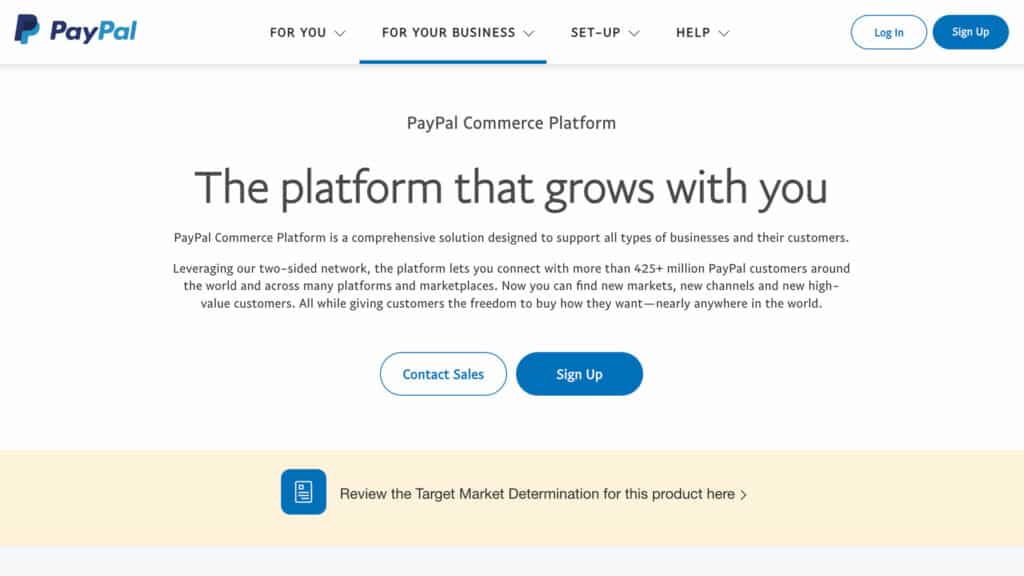
PayPal is one of the most widely recognised and used payment gateways in the world. It provides a secure and convenient way for businesses to accept payments online, with the added benefit of its large user base.
How It Works
Businesses can integrate PayPal into their online store or app. When a customer makes a purchase, they can choose to pay with their PayPal account or a credit or debit card. PayPal processes the transaction and deposits the funds into the business's PayPal account.
Fees
PayPal charges a fee per transaction, with no setup or monthly fees. However, fees can vary, so it's always a good idea to check the most current rates on the PayPal website.
Unique Features
PayPal's unique features include its large user base, which can help increase conversion rates, and its One Touch checkout, which allows customers to pay without entering their login or payment information.
Supported Platforms
PayPal can be integrated with a wide range of e-commerce platforms, including Shopify, WooCommerce, and Magento. It also offers a robust API for custom integrations.
Suitability for Australian Businesses
PayPal's wide recognition and user base make it a strong choice for Australian businesses, especially those that sell to consumers. Its One Touch checkout can also provide a better shopping experience for customers.
Comparison with Other Payment Gateways
Compared to other payment gateways, PayPal stands out for its large user base and One Touch checkout. However, its transaction fees may be higher than some other options, so businesses should consider their specific needs and budget.
3. Square

Square is a versatile payment gateway known for its point-of-sale (POS) systems and mobile payment solutions. It offers a range of products that cater to businesses of all sizes, from small retailers to large enterprises.
How It Works
Businesses can integrate Square into their online store, physical store, or both. Square provides hardware for in-person payments and software for online payments. When a customer makes a purchase, Square processes the transaction and deposits the funds into the business's bank account.
Fees
Square charges different rates for online, in-person, and invoice payments. There are no setup or monthly fees. However, fees can vary, so it's always a good idea to check the most current rates on the Square website.
Unique Features
Square's unique features include its POS systems, which allow businesses to accept in-person payments, and its free online store platform, which enables businesses to sell online easily. Square also offers inventory management tools and customer relationship management (CRM) features.
Supported Platforms
Square can be integrated with a variety of e-commerce platforms, including Shopify, WooCommerce, and Magento. It also offers a robust API for custom integrations.
Suitability for Australian Businesses
Square's versatility and comprehensive features make it a strong choice for Australian businesses, especially those that operate both online and offline. Its free online store platform can be particularly beneficial for small businesses or startups.
Comparison with Other Payment Gateways
Compared to other payment gateways, Square stands out for its POS systems and free online store platform. However, its transaction fees may be higher than some other options, so businesses should consider their specific needs and budget.
4. Shopify Payments
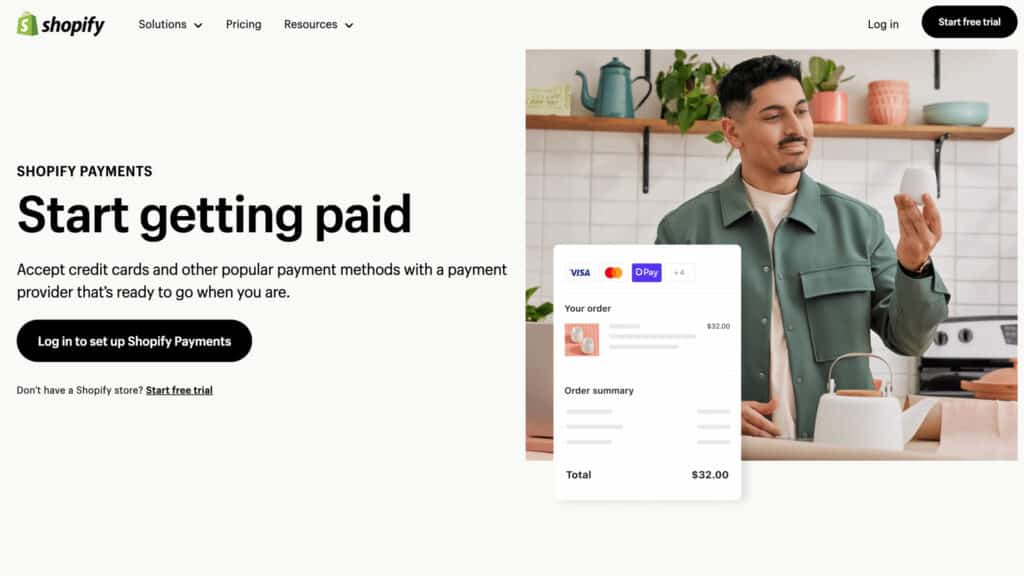
Shopify Payments is the integrated payment gateway for Shopify, one of the most popular e-commerce platforms. It provides a seamless checkout experience for customers and simplifies the payment process for businesses.
How It Works
Businesses using Shopify can enable Shopify Payments to accept credit card payments directly on their store. When a customer makes a purchase, Shopify Payments processes the transaction and deposits the funds into the business's bank account.
Fees
Shopify Payments charges a fee per transaction, with the rate depending on the business's Shopify plan. There are no setup or monthly fees specifically for Shopify Payments, but the overall Shopify plan does have a monthly cost. Fees can vary, so it's always a good idea to check the most current rates on the Shopify website.
Unique Features
Shopify Payments' unique features include its seamless integration with the Shopify platform, which can help improve conversion rates, and its fraud analysis features, which help protect businesses from fraudulent transactions.
Supported Platforms
As an integrated part of Shopify, Shopify Payments is designed to work seamlessly with the Shopify platform. It does not integrate directly with other e-commerce platforms.
Suitability for Australian Businesses
For Australian businesses that use Shopify, Shopify Payments provides a seamless and convenient way to accept payments. Its fraud analysis features can also provide added security.
Comparison with Other Payment Gateways
Compared to other payment gateways, Shopify Payments stands out for its seamless integration with Shopify and its fraud analysis features. However, it's only an option for businesses that use Shopify, and its transaction fees may be higher than some other options, depending on the business's Shopify plan.
5. Eway

Eway is a leading payment gateway in Australia, providing a fast, simple, and secure way for businesses to accept payments online. It's known for its advanced fraud prevention, fast settlement times, and 24/7 Australian-based support.
How It Works
Businesses can integrate Eway into their online checkout process. Once integrated, customers can choose to pay via Eway at checkout. Eway processes the payment and sends the funds to the business's bank account.
Fees
Eway charges a small fee per transaction, with no setup or monthly fees. However, fees can vary, so it's always a good idea to check the most current rates on the Eway website.
Unique Features
Eway's standout features include advanced fraud prevention, fast settlement times, and 24/7 Australian-based support. Eway also offers a range of integration options, allowing businesses to integrate Eway with their existing systems and processes.
Supported Platforms
Eway can be integrated with a wide range of e-commerce platforms, including Shopify, WooCommerce, and Magento. It also offers a robust API for custom integrations.
Suitability for Australian Businesses
Eway's robust features, competitive pricing, and Australian-based support make it a strong choice for Australian businesses. However, businesses that need to accept international payments may need to consider other options, as Eway primarily focuses on the Australian market.
Comparison with Other Payment Gateways
Compared to other payment gateways, Eway stands out for its advanced fraud prevention and fast settlement times. However, it may not be the best choice for businesses that need to accept a wide range of international payments.
6. SecurePay

SecurePay, a business of Australia Post, is a premium online payment gateway for Australian businesses. It offers a secure and reliable platform for processing payments, with a focus on simplicity and ease of use.
How It Works
Businesses can integrate SecurePay into their online store or app. When a customer makes a purchase, SecurePay securely processes the transaction, encrypts the customer's payment information, and sends the funds to the business's bank account.
Fees
SecurePay charges a fee per transaction, with different pricing plans available based on business needs. However, fees can vary, so it's always a good idea to check the most current rates on the SecurePay website.
Unique Features
SecurePay offers a range of features designed to make online payments easy. These include advanced fraud prevention tools, the ability to accept payments from international customers, and the backing of Australia Post, a trusted name in Australian business.
Supported Platforms
SecurePay can be integrated with a wide range of e-commerce platforms, including Shopify, WooCommerce, and Magento. It also offers a robust API for custom integrations.
Suitability for Australian Businesses
SecurePay's robust features, competitive pricing, and the backing of Australia Post make it a strong choice for Australian businesses. It's a particularly good option for businesses that need to accept international payments.
Comparison with Other Payment Gateways
Compared to other payment gateways, SecurePay stands out for its advanced fraud prevention tools and the backing of Australia Post. However, its fees may be higher than some other options, so it's important for businesses to consider their specific needs and budget.
7. WorldPay
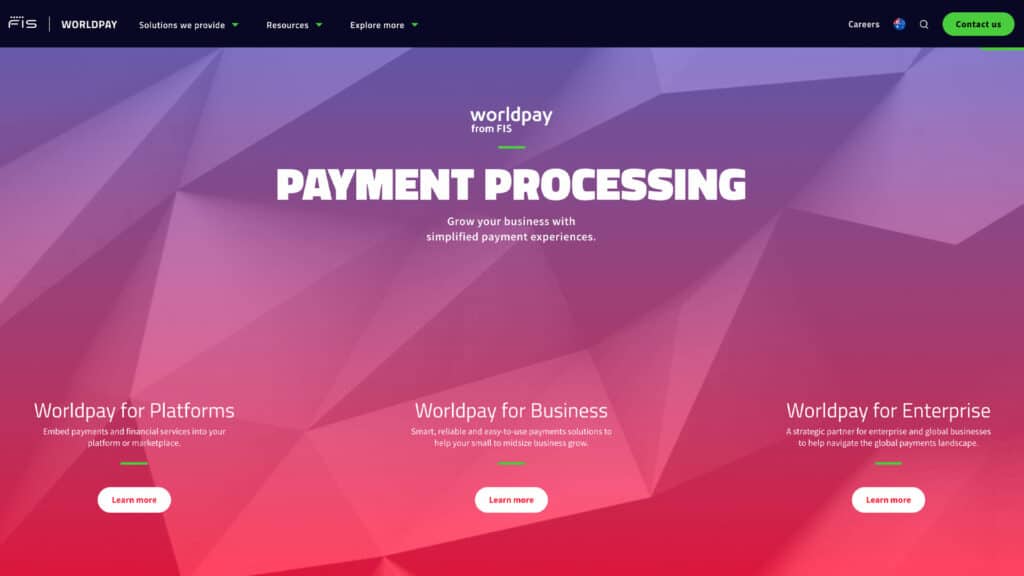
WorldPay is a global leader in payment processing that provides comprehensive payment solutions for businesses of all sizes. It offers a wide range of payment options, including credit and debit cards, mobile payments, and international payments.
How It Works
Businesses can integrate WorldPay into their online store or app. When a customer makes a purchase, WorldPay processes the transaction, encrypts the customer's payment information, and sends the funds to the business's bank account.
Fees
WorldPay's pricing structure can vary based on the specific services used and the volume of transactions processed. It's always a good idea to check the most current rates on the WorldPay website.
Unique Features
WorldPay's unique features include its wide range of payment options, advanced fraud protection tools, and global reach. It also offers detailed analytics and reporting tools to help businesses track and improve their performance.
Supported Platforms
WorldPay can be integrated with a wide range of e-commerce platforms, including Shopify, WooCommerce, and Magento. It also offers a robust API for custom integrations.
Suitability for Australian Businesses
WorldPay's comprehensive features and global reach make it a strong choice for Australian businesses that operate internationally. Its wide range of payment options can also provide a better shopping experience for customers.
Comparison with Other Payment Gateways
Compared to other payment gateways, WorldPay stands out for its wide range of payment options and global reach. However, its pricing structure can be more complex than some other options, so businesses should consider their specific needs and budget.
8. Pin Payments
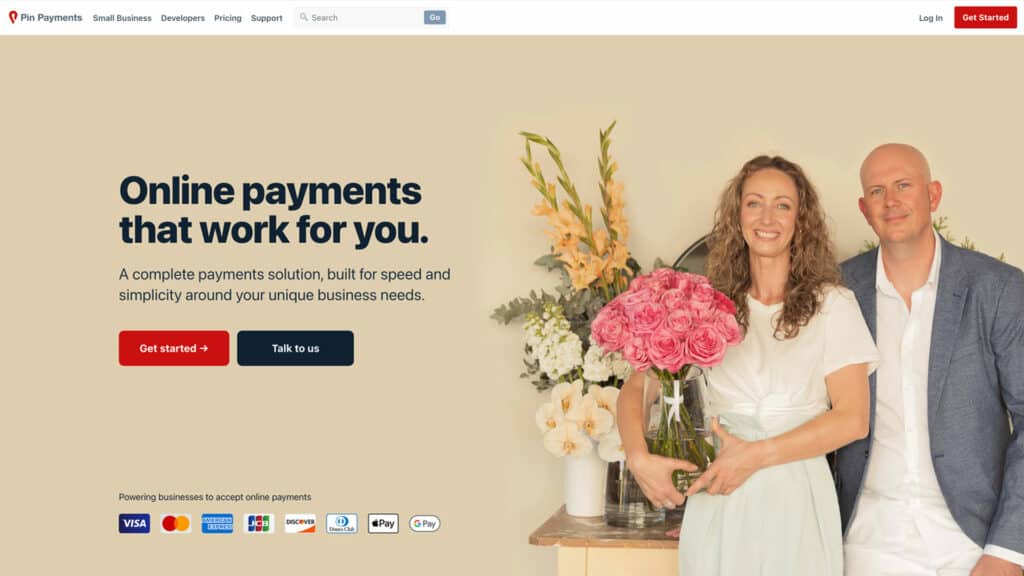
Pin Payments is an Australian-based payment gateway that allows businesses to accept payments from customers around the world, in multiple currencies, without the need for a merchant account.
How It Works
Businesses can integrate Pin Payments into their online store or app. When a customer makes a purchase, Pin Payments processes the transaction, encrypts the customer's payment information, and sends the funds to the business's bank account.
Fees
Pin Payments charges a fee per transaction, with no setup or monthly fees. However, fees can vary, so it's always a good idea to check the most current rates on the Pin Payments website.
Unique Features
Pin Payments' unique features include its ability to accept payments in multiple currencies and its no-merchant-account-required setup, which can make it easier for small businesses to start accepting online payments.
Supported Platforms
Pin Payments can be integrated with a variety of e-commerce platforms, including Shopify, WooCommerce, and Magento. It also offers a robust API for custom integrations.
Suitability for Australian Businesses
Pin Payments' easy setup and multi-currency support make it a strong choice for Australian businesses, especially small businesses and startups that want to start accepting online payments quickly and easily.
Comparison with Other Payment Gateways
Compared to other payment gateways, Pin Payments stands out for its no-merchant-account-required setup and multi-currency support. However, its transaction fees may be higher than some other options, so businesses should consider their specific needs and budget.
9. ANZ eGate
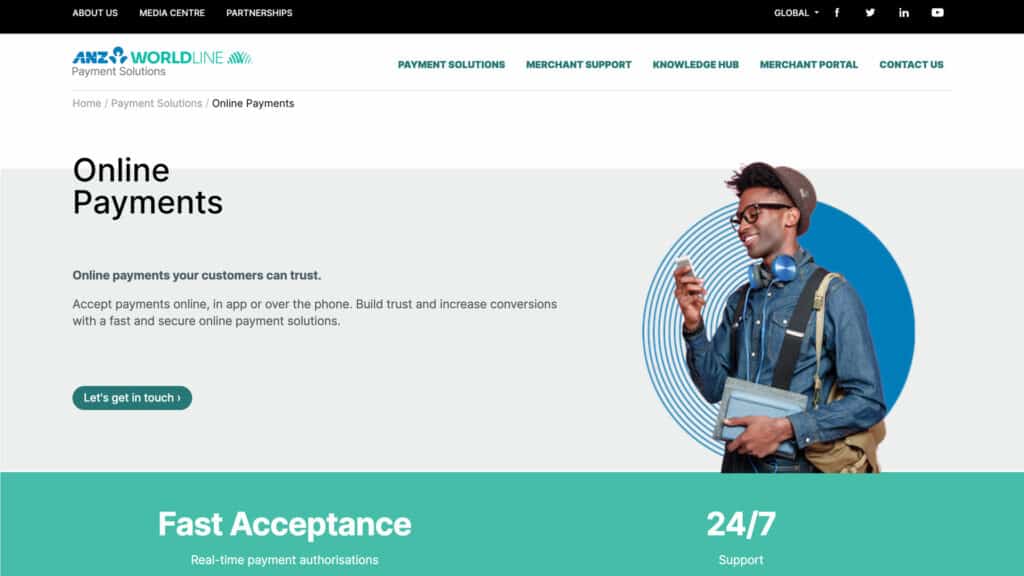
ANZ eGate is a secure and reliable payment gateway offered by ANZ, one of Australia's leading banks. It provides businesses with a simple and secure way to accept online credit card payments.
How It Works
Businesses can integrate ANZ eGate into their online store or app. When a customer makes a purchase, ANZ eGate processes the transaction, encrypts the customer's payment information, and sends the funds to the business's ANZ account.
Fees
ANZ eGate charges a fee per transaction, with additional fees for setup and monthly usage. However, fees can vary, so it's always a good idea to check the most current rates on the ANZ website.
Unique Features
ANZ eGate's unique features include its robust security measures, which are backed by ANZ's reputation as a leading bank. It also offers real-time transaction processing and detailed reporting tools.
Supported Platforms
ANZ eGate can be integrated with a variety of e-commerce platforms, including Shopify, WooCommerce, and Magento. It also offers a robust API for custom integrations.
Suitability for Australian Businesses
ANZ eGate's robust security, real-time processing, and detailed reporting make it a strong choice for Australian businesses, especially those that already bank with ANZ.
Comparison with Other Payment Gateways
Compared to other payment gateways, ANZ eGate stands out for its robust security and real-time processing. However, its fees may be higher than some other options, so businesses should consider their specific needs and budget.
10. 2checkOut
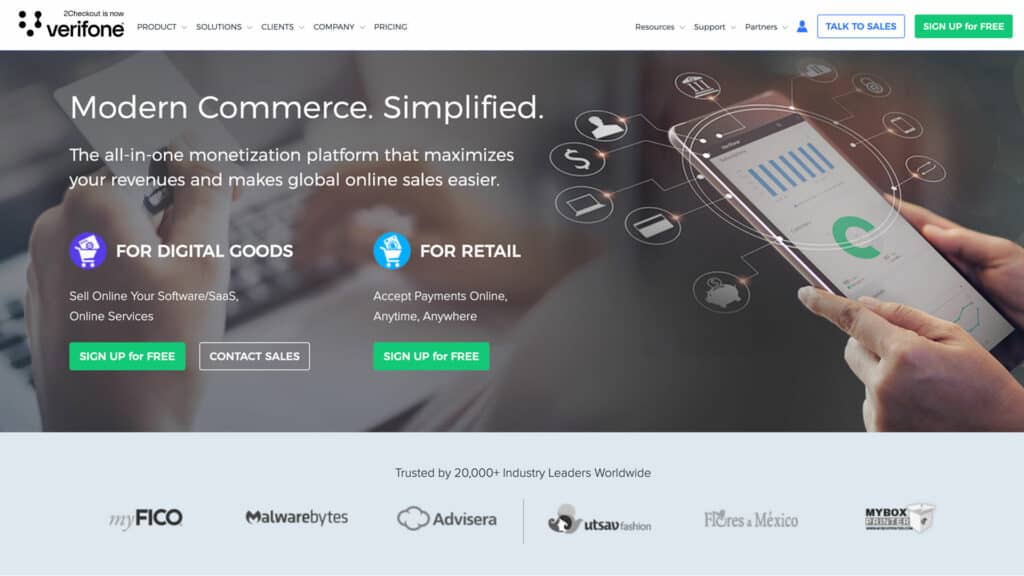
2Checkout is a global payment gateway that allows businesses to accept online and mobile payments from buyers worldwide, with localised payment options. It offers a range of features designed to help businesses maximise their online sales.
How It Works
Businesses can integrate 2Checkout into their online store or app. When a customer makes a purchase, 2Checkout processes the transaction, encrypts the customer's payment information, and sends the funds to the business's bank account.
Fees
2Checkout charges a fee per transaction, with different pricing plans available based on the specific services used and the volume of sales. However, fees can vary, so it's always a good idea to check the most current rates on the 2Checkout website.
Unique Features
2Checkout's unique features include its global reach, with support for multiple payment methods and currencies, and its advanced fraud protection. It also offers a range of marketing tools, such as cart abandonment recovery and up-selling capabilities.
Supported Platforms
2Checkout can be integrated with a wide range of e-commerce platforms, including Shopify, WooCommerce, and Magento. It also offers a robust API for custom integrations.
Suitability for Australian Businesses
2Checkout's global reach and advanced features make it a strong choice for Australian businesses that operate internationally. Its wide range of payment options can also provide a better shopping experience for customers.
Comparison with Other Payment Gateways
Compared to other payment gateways, 2Checkout stands out for its global reach and advanced marketing tools. However, its transaction fees may be higher than some other options, so businesses should consider their specific needs and budget.
How Payment Gateways Work

At its core, a payment gateway is a technology that acts as a conduit between an e-commerce website (or over-the-phone business) and the bank that authorises (or declines) a customer's credit card payment. The payment gateway performs a variety of tasks to process the transaction.
When a customer places an order from an online store, the payment gateway performs a series of tasks to finalize the transaction:
- The customer selects a product or service to purchase and proceeds to checkout.
- At checkout, the customer enters their payment details.
- The online store sends the transaction details to the payment gateway.
- The payment gateway sends the transaction information to the merchant's bank's processor.
- The transaction is then forwarded to the card association (Visa, MasterCard, etc.), which routes it to the issuing bank for approval.
- The issuing bank sends a response back to the processor. The response includes information about whether the transaction was approved or declined.
- The processor forwards the response to the payment gateway.
- The payment gateway forwards the response to the website (or whatever interface was used to process the payment) where it is interpreted and a relevant response then relayed back to the cardholder and the merchant.
This entire process happens in a matter of seconds!
The Importance of Security in Payment Gateways

Security is a paramount concern when dealing with financial transactions. Payment gateways utilize a variety of security measures to ensure the safe handling of sensitive information, such as credit card numbers, ensuring they are passed securely from the customer to the merchant, then from the merchant to the payment processor.
Key security measures used by payment gateways include encryption, where sensitive information is scrambled during transmission, and tokenisation, where sensitive data is replaced with unique identification symbols that retain all the essential information without compromising its security. Payment gateways also comply with the Payment Card Industry Data Security Standard (PCI DSS), which sets the standard for secure transactions.
The Role of Payment Gateways in the Customer Experience

Payment gateways play a significant role in the customer experience in online shopping. A smooth, secure, and efficient checkout process can significantly enhance the customer experience, leading to higher customer satisfaction and increased likelihood of repeat purchases.
Payment gateways also offer customers the flexibility to pay using their preferred payment method, be it credit card, debit card, or digital wallets. Some payment gateways even offer additional features like saved card details for faster checkout on future purchases, further enhancing the customer experience.
Things to Consider When Choosing a Payment Gateway
Choosing the right payment gateway is a crucial decision for any online business. The payment gateway you choose can significantly impact your customers' experience, your business's operations, and your bottom line. Here are some key factors to consider when making your choice:
Key Factors to Consider
- Fees: Every payment gateway charges fees, but the structure can vary. Some charge a flat fee per transaction, while others may also have setup fees, monthly fees, or other costs. It's important to understand the full cost of using a payment gateway before making a decision.
- Ease of Use: A payment gateway should be easy for both your customers and your team to use. For customers, a smooth and intuitive checkout process can help increase conversion rates. For your team, a user-friendly backend can make managing payments and resolving issues easier.
- Customer Service: Excellent customer service is crucial. You need to be able to rely on your payment gateway provider to resolve issues quickly and effectively to ensure minimal disruption to your business.
- Integration with Other Systems: Your payment gateway needs to work seamlessly with your other systems, such as your e-commerce platform, accounting software, and CRM. This can help streamline your operations and provide a better customer experience.
Considering Your Business's Specific Needs
Every business is unique, and what works well for one business may not work as well for another. When choosing a payment gateway, it's important to consider your business's specific needs. For example, if you sell internationally, you might need a payment gateway that supports multiple currencies. If you sell subscription-based products, you might need a payment gateway that supports recurring payments.
Final Thoughts
Choosing the right payment gateway is not a decision to be taken lightly. It requires a clear understanding of your business needs, careful comparison of different options, and thoughtful consideration of your customers' preferences and expectations. By doing so, you can ensure a smooth and secure payment process, leading to higher customer satisfaction and ultimately, business success.
Remember, the best payment gateway for your business is the one that fits your unique needs and provides the best experience for your customers. So, take your time, do your research, and make the choice that's right for you.

Are you looking to start a small business in Australia? Look no further! We've compiled a list of amazing small business ideas that can truly transform your life. Whether you're based in a rural area or a bustling city like Sydney, Melbourne, or Brisbane, these ideas are tailored to meet the growing demand across various industries. The best part? There's a significant gap in the market just waiting to be filled.
Take a moment to scan through this list and find a few ideas that resonate with you. Once you've narrowed it down, do a bit of research to assess the current market in your area. You'll likely discover untapped opportunities and weak competition, making it easier for you to establish your presence. The great news is that these small business ideas require low start-up costs and come with minimal risk. With the right effort and dedication, success is within your reach.
Table of Contents
Things to Consider Before Starting

One of the key advantages of the small business ideas we present here is their scalability. You can start small and gradually expand your operations as you gain momentum. If you have some funds to invest and time to spare, consider focusing on niche services that promise higher returns right from the start. The more specialised the service, the greater your chances of success.
What's even better is that none of these small business ideas involve selling physical products. Instead, they revolve around providing valuable services that can be further enhanced over time. By choosing a service-oriented approach, you can differentiate yourself from competitors who engage in price wars. Customers are willing to pay a premium for exceptional service delivered promptly. Many businesses in these industries struggle with speed, but that's where you can shine. Leverage your tech skills and basic computer software proficiency to your advantage. Older individuals often run established small businesses in these industries and may not be tech-savvy. By offering quick quotes, implementing job tracking software, and efficient management systems, you can position yourself as a reliable and efficient service provider.
If you're switched on and possess even the most basic computer skills, you already have a significant advantage over your competitors. Embrace the opportunities that technology presents, as many well-established small businesses in these industries are slow to adapt. Their reluctance to embrace technology means they miss out on the benefits of streamlined processes and efficient customer service. By recognising the value of software and technology, you can gain an edge in the market.
Gardening and Landscaping Business Ideas

If you have a passion for plants and enjoy working in the garden, there are exciting business opportunities tailored just for you. These gardening business ideas allow you to turn your love for plants into a rewarding venture.
Whether you excel in landscaping, have a talent for pruning and hedge trimming, or possess a knack for creating stunning gardens, there is a gardening business idea that can transform your green thumb into a thriving enterprise.
From providing professional garden maintenance services to offering expert advice on plant care and design, these opportunities allow you to channel your passion and create beautiful outdoor spaces for your clients to enjoy. With the right skills, knowledge, and dedication, you can cultivate a successful business while doing what you love most—working with plants.
1. Lawn Mowing Business
A lawn mowing business is not something that many people think of turning into a full time small business in Australia. Almost every single person who owns a house has a lawn and a lot of commercial properties have some form of lawn as well. The opportunities are endless to make money with a lawn care business in Australia.
Getting Started
2. Garden Pruning and Hedge Trimming Business
One of the important tasks of garden maintenance in Australia is pruning and trimming of trees. You can charge up to $1,500 for hedge trimming depending on the size and length of the hedge and the condition it is in.
Getting Started
3. Landscaping Business
It doesn’t cost much money to start a small landscaping and gardening business in Australia. All you need is a ute or van, a lawn mower and some small hand tools. The work you take on can range from basic lawn maintenance to detailed design projects.
Getting Started
- How to Start a Landscaping Small Business in Australia
- Setting up a Landscaping Business With No Startup Money
- Basic tools checklist for General Lawn and Gardening
- Get a Website For Your Landscaping Business
4. Tree Trimming Business
Tree trimming and removal service is a growing business trend in Australia. You can tap into this huge industry and start making money by getting some professional tree-care training and knowledge. You might need a license to legally start a tree trimming business in Australia. But, once you have it, you get the green light to help home owners with trimming, pruning, branch & stump removal, and tree maintenance. If you love tree trimming and climbing, this could be the business for you.
Getting Started
- How to Start a Tree Cutting Business
- Tree Cutting Business: Your 10-Point Checklist
- What are Tree Trimming Business Essentials?
- Get a Website For Your Window Cleaning Business
5. Irrigation Business
Irrigation or watering systems is a basic need for most home owners in Australia. You can start an irrigation business and charge customers to install watering systems on their farm land, parks, fields, and home lawns. It is a solid and advantageous business in Australia, and you can make huge profits by going for this option. With the right knowledge and skills, you can start this money-making business right away.
Getting Started
6. Auger Boring Business
Starting an auger boring business in Australia is expensive. You need to have the required skills and knowledge to handle the business. Plus, purchasing machines need a lot of capital. The advantage of auger boring business is, once you set up your company, clients are readily available, which means it is a profitable business.
Getting Started
- What Makes a Great Auger Boring Company
- Requirements for Starting an Auger Boring Business
- How To Find The Right Fit For Your Auger Boring Project
- Get a Website For Your Auger Boring Business
Rental and Delivery Business Ideas

Rental and delivery businesses are becoming really popular because they make things super easy for customers. These businesses let people borrow things they need for a little while without having to buy them. It's a smart choice if you want flexibility and save money.
For example, you can rent tools, equipment, or even cars instead of buying them. And with delivery businesses, you don't have to go out to get what you need. They bring things right to your doorstep, like food or packages.
These businesses are all about making life easier for people. If you're thinking about starting a rental or delivery business, you'll be part of a growing industry that offers convenient solutions for everyone.
7. Skip Bin Rental Business
Living in an untidy place can be very dangerous. You are exposing yourself to diseases and unhealthy living. Skip bin rental business in Australia is very beneficial to homeowners and businesses. Most companies, such as Industrial companies, mining companies, and logging companies, prefer to use skip bin services to eliminate waste materials. These services are highly appreciated, and it makes it an excellent idea to start such a business.
Getting Started
- How to Start a Skip Bin Rental Business
- Tips for Starting a Skip Bin Rental Business
- Requirements to Start a Skip Bin Rental Business
- Get a Website For Your Skip Bin Rental Business
8. Portable Toilet Rental Business
When you eat, digestion is going to take place. After digestion, what happens next? Yes, this happens to everyone. So your idea of starting a porta potty rental business might be the solution to most people. In Australia, you hardly miss a weekend without a party. It could be a wedding, birthday celebration, or a graduation party. Take advantage of all these events to rent out toilets.
Getting Started
- How to Start a Portable Potty Rental Business
- Tips to Help You Start-up an Excellent Porta Potty Rental Business
- Equipment Required to Start a Porta Potty Rental Business
- Get a Website For Your Porta Potty Rental Business
9. Firewood Delivery Business
The only things you need to start up a firewood delivery business in Australia is a place to store bulk amounts of cut wood and a large enough vehicle to deliver it. You don’t even have to cut it yourself. Just buy firewood in bulk from a lumber mill and sell it on to the customer. This completely cuts out the hard labour.
Getting Started
- Starting a Firewood Delivery Business in Australia
- Laws for Selling Firewood in Australia
- Firewood Delivery Business Ideas and Tips
- Get a Website For Your Firewood Delivery Business
Home Improvement Business Ideas

Home improvement businesses are all about making homes better! They help people fix things, make changes, and create beautiful spaces. Handyman services are great for fixing all sorts of problems around the house, like leaky faucets or squeaky doors.
Some businesses specialise in remodelling kitchens and bathrooms, making them look brand new. Others focus on installing new floors or restoring old ones to make homes more cozy. There are so many ways to improve homes and make them special places to live!
10. Pest Control Business
Starting a pest control business in Australia will be very profitable. Most small pest control business owners make over $80,000 a year. There will always be pests getting into peoples homes and those people need someone to get rid of them.
Getting Started
- Starting a Pest Control Business in Australia
- Pest Control Licensing in Australia
- Essential Equipment for Your Pest Control Business
- Get a Website For Your Pest Control Business
11. Fence Installation Business
The fence installation business is a booming business in Australia. If you enjoy working outdoors and care about other people’s security, then the fence installation business is fit for you. Moreover, security is not the only reason for fencing; beauty can as well be a reason. There are those people who fence their homes in seasons for beauty purposes. All you will do is get contracts with homeowners and corporations, and your business will grow within a short period.
Getting Started
- 9 Steps on How to Start a Fence Installation Business
- How to Run a Fencing Business
- Materials Needed for Fence Installation
- Get a Website For Your Fence Installation Business
12. Garage Door Service and Installation Business
A garage door service and installation business involve installing new garage doors, repairing, replacing existing doors, and requiring large capital to start. If you are thinking of creating such a business, you need to prepare yourself psychologically and financially. However, once you start, it can give good returns, and it is less competitive as not many people have the knowledge nor capabilities to start the same business.
Getting Started
- How to Start a Garage Door Service and Installation Business
- Tips to Understand before Starting a garage Door Service and Installation Business
- Get a Website For Your Garage Door Service and Installation Business
13. Mirror Installation Business
Mirrors have several functions when installed. They give light as decoration, and when opened, they allow fresh air. This shows how essential mirrors are, so why not take advantage and start a mirror installation business if you possess the right skills. It can be a profitable business with high demand.
Getting Started
- Requirements Needed to Start a Mirror Installation Business
- How to Start a Mirror Installation Business
- How to Become an Expert Mirror Installer While Starting your Business
- Get a Website For Your Mirror Installation Business
14. Custom Lighting Installation Business
Who does not love good lighting, whether it is indoor or outdoor lighting? The lighting installation business involves fixing light bulbs and tubes to enhance good lighting when dark. Opening a custom lighting installation business is an excellent idea since many people have zero knowledge of installing.
Getting Started
- How to start a Custom Lighting Installation Business
- Tools Needed for Custom Lighting Installation Business
- How to Start Your Own Lighting Business with a Small Investment
- Get a Website For Your Custom Lighting Installation Business
15. Custom Wallpaper Installation Business
Custom wallpaper installation business involves the covering of walls with wallpapers using your designs. If you are an interior designer, this is an excellent opportunity for you as most people love beautiful houses. You can offer your services by installing wallpapers that suit their preferences.
Getting Started
- How to Start a Custom Wallpaper Installation Business
- Equipment for Starting a Custom Wallpaper Installation Business
- Lessons to Learn Before Starting a Custom Wallpaper Installation Business
- Get a Website For Your Custom Wallpaper Installation Business
16. Interior Painting Business
Unlike the exterior painting, interior painting needs more focus and attention. You need to consider colours that will enhance enough like, appealing, and match with other equipment such as chairs, curtains, and carpet. You need to have enough experience before starting an interior painting business.
Getting Started
- How to start an interior painting business
- Tools for Starting an Interior Painting Business
- How to Market an Interior Painting Business
- Get a Website For Your Interior Painting Business
17. Exterior Painting Business
External painting involves covering the outside walls of a building with paint, whereby you can use several colours to bring out the theme anticipated. As an exterior painter, take advantage of the opportunity by opening an exterior painting business, and it is a decision you will never regret as this business is in high demand in Australia, especially on commercial buildings
Getting Started
- How to Start an Exterior Painting Business with Low Budget
- Requirements Before Starting an Exterior Painting Business
- Tips on How to Run a Successful Exterior Painting Business
- Get a Website For Your Exterior Painting Business
18. Deck Staining Business
Restoring and staining decks is the right choice to make home exteriors beautiful. Be it a porch, backyard, entrance, or garden area, decks should be neat and clean always. Deck staining is one of the budding businesses in Australia, and you can make considerable profits from this business. If you have the experience, knowledge, passion, and the right tools, this business is definitely a go.
Getting Started
- Deck Restoration:A Step-by-step Beginners Guide
- The Top 5 Deck Staining Tips from the Experts
- DIY Staining a Deck
- Get a Website For Your Deck Staining Business
19. Residential House Painting Business
A house painting business can be pretty cheap to start up in Australia. All you need is some paint, a ladder, covers and the brushes to put the paint on the walls. You could easily get everything you need for under $1000 and start selling your services.
Getting Started
- How to Start a Residential House Painting Business
- Pros and Cons of Starting a Residential House Painting Business
- How to Paint a Room, Tools and Materials
- Get a Website For Your Residential House Painting Business
Cleaning Business Ideas

If you love to clean and keep things tidy, there are many business ideas that you can try! You can start a house cleaning business where you go to people's homes and make them sparkle and shine. Cleaning windows is another option, making them crystal clear and letting in lots of light.
No matter what type of cleaning you enjoy, there are lots of opportunities to turn your passion into a successful business!
20. Fire Damage Restoration Business
The fire damage restoration business is a business you can operate from home. It involves assisting those affected by the fire to repair the damage caused. Small fire accidents are likely to happen, so you will most likely find people you can help restore the damage. Also, you can put some preventive measures to protect such an incident from reoccurring.
Getting Started
- Tips on Starting a Fire damage Restoration Business
- Tips on the Process to Restore Damage Caused by Fire
- What to Know Before Starting a Fire Damage Restoration Business
- Get a Website For Your Fire Damage Restoration Business
21. Home Odour Removal Business
Home odours are a common thing having caused by dust, smoke, pet odours, and trash. Now and then, people want to remove these odours to keep their houses fresh. Starting a home odour removal business can be an excellent idea. You get to employ yourself; all you need are the equipment necessary for the job.
Getting Started
- How to Start a Home Odour Removal Business
- Basic Products for Home Odour Removal Business
- Steps on How to Start a Home Odour Removal Business
- Get a Website For Your Home Odour Removal Business
22. Gutter Cleaning Business
Gutter cleaning is a profitable opportunity for those who wish to earn more money in a short period. Because it is a seasonal business in Australia, the demand can be extremely high sometimes. You can opt for this business, if you have necessary equipment, techniques, and passion to do this dirty-dangerous job. There are endless opportunities in gutter cleaning business in Australia.
Getting Started
23. Maid Services Business
House chores are tiresome, especially for people working from home at office desks. They tend to hire someone to assist them with the tasks. It is a booming business in Australia, and it may be a perfect choice starting a maid services business.
Getting Started
- How to Start a Maid Services Business
- Do this when starting your maid service business
- Steps to a Successful Maid Service Business
- Get a Website For Your Maid Service Business
24. Carpet Cleaning Business
Nowadays, carpets have become a necessity in every home. Meaning carpet-cleaning business is in high demand. You might need to take advantage of the opportunity by asking people to hire you to clean their carpets. You can start with practically zero cents, as it is an affordable business.
Getting Started
25. Graffiti Removal Business
The graffiti removal business is a business associated with removing unwanted graffiti from buildings and other surfaces. It requires less capital to start since you will only need to purchase a pressure washing machine and paint to repaint the area.
Getting Started
26. Mould Removal Business
The mould removal business involves working on the disasters that floods cause. With the current natural disasters happening, one needs adequate preparations in case something happens. It is a perfect idea to start a mould removal business, as it is an ideal business to earn your income in Australia.
Getting Started
- Requirements Needed Before Starting a Mould Removal Business
- How to Start a Mould Removal Business
- How to Market a Mould Removal Business
- Get a Website For Your Mould Removal Business
27. Pool and Spa Cleaning Business
Pool and spa cleaning is a solid, profitable market in Australia. With more than 2 million residential pools, Australia can be the best place to take your business off the ground. Once you get the business technicalities and right knowledge, you can start out making enough money. All you require is some advanced products and equipment to be a part of this pool cleaning industry.
Getting Started
28. Window Cleaning Business
Starting a window cleaning business in Australia is an absolutely great venture for those who wish to be their own boss. You can start this business in Australia without a huge establishment cost. You just need is few simple tools, equipment and get insured. Follow the latest window cleaning technology to offer the best-quality services. Switching to window cleaning can be your next great career move, go for it today.
Getting Started
- How to Start a Profitable Window Cleaning Business
- How to Start a Window Cleaning Business
- Thinking of Starting a Window Cleaning Business? Read this first
- Get a Website For Your Window Cleaning Business
29. Pressure Washing and Concrete Cleaning Business
Starting a pressure washing business and concrete cleaning business in Australia can almost never go wrong. You don’t need any special certificates and the training will take you very little time. The upfront expenses are very low, all you need is a good quality pressure washer to get started. Once you are up and running there isn’t really much more you will need.
Getting Started
- How to Start a Pressure Washing and Concrete Cleaning Business
- Equipment Needed to Start a Pressure Washing and Concrete Cleaning Business
- Income Potential of a Pressure Washing and Concrete Cleaning Business
- Get a Website For Your Pressure Washing and Concrete Cleaning Business
30. Water Damage Restoration Business
Water pipe bursting is an everyday occurrence in most homes. The damage it causes needs fixing, and that is where you come in. with a water damage restoration business, you will assist in resolving the damage; in return, you earn a living. It is an excellent business since you can operate it from the comfort of your home.
Getting Started
- How to Start a Water Damage Restoration Business
- Tips on How Water Damage Restoration Business Work.
- Requirements for Starting Water Damage Restoration Business
- Get a Website For Your Water Damage Restoration Business
31. On Demand Cleanup Crew Business
Everyone loves a tidy place, whether at home or at the office. Unfortunately, not so many people want to do the cleaning work. Your idea of starting a cleaning business will be an excellent opportunity for you and the customers. It can offer good returns when you know how to connect with people and be great at what you do. In Australia, the cleaning business is popular with diverse options to choose from, for example, warehouses, houses, offices, retail shops, and storefronts.
Getting Started
- How to Launch a Successful Cleaning Business
- How to Start a Cleanup Business
- 8 Bases to Start a Cleaning Business in Australia
- Get a Website For Your On Demand Cleanup Crew Business
Work From Home Business Ideas

If you prefer to work from the comfort of your own home, there are plenty of business ideas that you can explore! One option is to become a virtual assistant, where you can provide administrative support to clients remotely. Another idea is to start an online tutoring business, helping students with their studies through video calls and online resources. If you have a creative side, you can offer freelance services such as graphic design, writing, building topnotch backlinks or website development.
You could also consider starting a home-based bakery or catering business, sharing your delicious treats with others. There are also opportunities to become an online seller by creating your own products or reselling items through platforms like Etsy or eBay.
With determination and a bit of creativity, you can find a work-from-home business idea that suits your skills and interests!
32. Bookkeeping Business
If you are perfect in numbers, then consider starting a bookkeeping business. Most businesses in Australia require bookkeepers. Opening a bookkeeping business, you will be advertising your services to clients. Despite the company taking much of your time, you will be earning a good figure. An Australian bookkeeper charges an average rate of $60-$65 per service hour.
Getting Started
- 8 Steps on How to Start a Bookkeeping Business
- Tips for Starting a Bookkeeping Business
- Services to Offer in a Bookkeeping Business
- Get a Website For Your Bookkeeping Business
33. Vacation Rental or Airbnb Management Business
the vacation rental industry is taking off in Australia with more people than ever renting out their homes on Airbnb. Offering to manage all the work that is involved with renting a property can be very profitable. Running a vacation rental or Airbnb management business in Australia involves finding new rentals, looking after the day to day workings of the rentals, advertising and actually renting out these homes to travellers.
Getting Started
Car and Boat Business Ideas

If you have a passion for cars or boats, there are several business ideas you can explore in these industries. You could start a car detailing business, where you clean and polish cars to make them look brand new. Another idea is to offer mobile car repair services, where you can travel to clients and fix minor issues with their vehicles. If you're skilled in mechanics, you could start an auto repair shop and offer services like oil changes, brake repairs, and engine diagnostics.
For boat enthusiasts, you could consider starting a boat cleaning and maintenance business, providing services such as hull cleaning, waxing, and engine maintenance. Additionally, you could offer boat rental services, allowing people to enjoy a day out on the water without owning a boat themselves.
With these car and boat business ideas, you can combine your passion with entrepreneurship to create a successful venture.
34. Boat Cleaning Business
Most boat owners enjoy the luxury that it comes with it, but it becomes a different case when it comes to cleaning. For this significant reason, if you have the skills as a boat cleaner, you think of investing in the boat cleaning business, this is a perfect time. An advantage of the business is it does not have high competition, and the profits are high.
Getting Started
- How to Start a Boat Cleaning Business on a Tight Budget
- A Business Plan Sample as a guide on How to Start a Boat Cleaning Business
- Tips to a successful boat cleaning business
- Get a Website For Your Boat Cleaning Business
35. Boat Repair and Maintenance Business
Most people who own boats mostly have zero knowledge when it comes to service and repairs. As a boat mechanic, this would be an excellent opportunity to earn a living. The boat repair and maintenance business can be very profitable, mainly because the competition is low.
Getting Started
- How to Start a Boat Repair and Maintenance Business
- 15 Essential Tools For Boat Repair and Maintenance Business
- Tips to Offer Clients as a Boat Repair and Maintenance Business Owner
- Get a Website For Your Boat Repair and Maintenance Business
36. Caravan and Motorhome Cleaning Business
Starting a caravan & motorhome cleaning business is very cheap. It is a business that takes less than 20hrs weekly. Plus, it offers good returns. All you need is to talk to your neighbours who own one caravan or motorhome, and you are good to go. The business does not require any certification, hence suitable for everyone.
Getting Started
- How to Start a Caravan & Motorhome Cleaning Business
- Tools for Cleaning a Caravan & Motorhome
- Learn how to wash and maintain a caravan & Motorhome before starting your business
- Get a Website For Your Caravan and Motorhome Cleaning Business
37. Mobile Oil Change Business
Mobile oil change business is a business with a ready market. It involves providing quick oil changes and basic automotive services at clients sites. Starting a mobile company may earn you handsomely. So get your hands dirty for a good course.
Getting Started
- How to Start a Mobile Oil Change Business
- Cost of starting a mobile oil change business
- A Guide to Start a Mobile Oil Change Business
- Get a Website For Your Mobile Oil Change Business
38. Mobile Tyre Sales and Service Business
Tyre sales and service business is a profitable business in Australia. Most people own vehicles, and with the wear and tear of tyres, it makes the tyre and service business more popular. Mobile businesses have an advantage since they do not have to worry about rent and space.
Getting Started
- How to Start a Mobile Tyre Sales and Service Business
- Tools Needed For Starting Up a Tyre and Service Business
- Legal Advice on Starting a Mobile Tyre Sale and Service Business
- Get a Website For Your Mobile Tyre Sales and Service Business
39. Mobile Glass Repair Business
Glass-made commodities are fragile and require repair now and then. If your capabilities allow you to repair glass properties, it is high time to create the business. Use your passion to generate income as well as grow your career.
Getting Started
- How to Start a Mobile Glass Repair Business
- Why Think of Starting a Mobile Glass Repair Business
- 7 Guidelines to a Mobile Glass Repair Business
- Get a Website For Your Mobile Glass Repair Business
40. Mobile Car Detailing and Washing Business
There is an endless amount of people around you who have nice cars that are dirty and they have no time to take them to a car detailer. By being mobile and coming straight to them you are providing a highly valuable service. A one-person mobile car detailing and washing business in Australia can make over $90,000 per year. All you need to get started is cleaning products and a car to get around.
Getting Started
- How to Start a Mobile Car Detailing and Washing Business From Scratch
- 10 Tips for Starting a Car Detailing and Washing Business
- Equipment & Supplies Needed to Start a Mobile Car Detailing and Washing Business
- Get a Website For Your Mobile Car Detailing and Washing Business
41. Mobile Car Mechanic Business
Australia has huge lengths of highway all over the country where people can break down. Mobile mechanics make car repairing jobs easier by offering mobile repairs at your home, workplace, or anywhere else you might be having car troubles. From checks and oil change to complete vehicle servicing, skilled car mechanics in Australia bring equipment right to the spot where your car breaks down, saving a huge amount on a towing service. You can start a mobile car mechanic business to offer customers the convenience a normal mechanic shop cant.
Getting Started
- How to Start a Mobile Mechanic Business
- Things you Need to Start a Mobile Mechanic Business
- How and Why You Should become a Mobile Mechanic
- Get a Website For Your Mobile Car Mechanic Business
Creative Business Ideas

If you have a creative spirit and love to express yourself artistically, there are plenty of business ideas that can harness your creativity.
You could start a custom artwork business, where you create personalised paintings, drawings, or sculptures for clients. Another option is to offer graphic design services, helping businesses with logo design, branding materials, and marketing collateral. If you enjoy crafting, you could start a handmade jewellery or accessories business, creating unique and one-of-a-kind pieces. Photography is another creative avenue to explore, where you can offer your services for events, portraits, or product photography. If you have a flair for writing, consider starting a freelance writing or copywriting business, helping businesses with website content, blog posts, or marketing materials.
Whether it's through visual arts, design, crafts, or writing, these creative business ideas allow you to showcase your talents and make a living doing what you love.
42. Interior Design Business
Interior design involves decorating a house or office from the inside, starting from walls, household equipment, and lighting facilities. To start an interior design business, you need specific skills to bring out your clients’ tastes and preferences to their satisfaction.
Getting Started
- How to Start an Interior Design Business
- Skills you Need Before Starting an Interior Design Business
- Steps on How to Launch an Interior Design Business
- Get a Website For Your Interior Design Business
43. Home Office Fit Out Business
Most people have a problem with rental spaces since they appear smaller in most cases, and it isn’t easy to arrange them. You can start a home office fit-out business where you will be assisting people in organising their luggage in a manner they can fit in that small space. It’s no secret a lot of people suffer from this kind of problem. If you offer your services, you will be helping them feel more comfortable, and in return, they will be willing to pay a reasonable price for the service.
Getting Started
- Tips on How to Set-Up Home Office fit-out Business
- Tips for a successful Home office fitout
- Benefits of Starting a Home Office Fit Out Business
- Get a Website For Your Home Office Fit Out Business
Safety and Security Business Ideas

If you have a passion for safety and security, there are various business ideas that can help keep people protected.
One option is to start a home security installation business, where you can help homeowners install alarm systems, surveillance cameras, and secure locks. Another idea is to offer personal safety training, teaching self-defence techniques and safety protocols to individuals and organisations. You could also consider starting a cybersecurity consulting business, helping businesses safeguard their digital assets and protect against cyber threats. Another opportunity is to provide safety equipment and gear, such as helmets, safety goggles, or protective clothing, by starting a safety equipment supply business. Additionally, you could offer security guard services, providing trained personnel to protect events, properties, or individuals.
These safety and security business ideas allow you to contribute to the well-being of others and provide peace of mind in an increasingly uncertain world.
44. Locksmith Business
A locksmith business involves designing, fixing, and repairing of locks. Every building contains doors. This makes the locksmith business very lucrative and profitable. If you dream of starting such a business, you are on the right track.
Getting Started
- How to Start a Locksmith Business
- Equipment Needed To Start a Locksmith Business
- Qualifications needed to be a professional locksmith
- Get a Website For Your Locksmith Business
45. Manned Home Security Services Business
If you have been in the security or military sectors before, this is the perfect business for you to run. You have the skills needed to handle any threats that come in people’s way and possess knowledge of where many risks occur and how to avoid them. It would help if you focused on putting your clients at ease by offering the maximum security quality and being reliable. Consider targeting big business entities and event organisers as your primary clients to gain popularity. Train your staff to be honest and responsible for maintaining a good reputation in the market.
Getting Started
- How to Start a Manned Home Security Services Business
- Follow these steps to create a security services business successfully
- Strategies on How to Start a Manned Home Security Services Business
- Get a Website For Your Manned Home Security Services Business
46. Private Investigating Business
A private investigating business involves assisting people in legal, financial, and personal matters. In case you want to start such a business, one needs to know how to run these fields to avoid unlawful acts and give the clients the best services. The structure of the company can be a corporation or a Limited Liability Company. Consider setting up a legal entity to avoid personal liability with the law.
Getting Started
- How to Start a Private Investigating Business
- Instructions needed to start a private investigation business
- Requirements and Tips Needed To Start and Run a Private Investigating Business
- Get a Website For Your Private Investigating Business
47. Gate and Keypad Entry Installation Business
Security is essential; hence, every homestead contains a gate. With the appropriate knowledge of installing gate and keypad entry, you can start a gate and keypad entry installation business. It is a good business with less competition and highly profitable.All you need a handyman experience to operate this business. Your clients can be homeowners, real estate agents, small or large firms; hence, operations flexibility is essential. Quality of service delivery will determine the growth and expansion of your business. Ensure to purchase materials needed from reputable suppliers to avoid malfunction of the systems and low reviews from clients.
Getting Started
- How to Start a Gate and Keypad Entry Installation Business
- Benefits Associated with Starting a Gate and keypad Installation Business
- Tips For Setting Up Your Own Gate And Keypad Entry Installation Business
- Get a Website For Your Gate And Keypad Entry Installation Business
Business Ideas for Animal Lovers

If you have a deep love for animals, there are several business ideas that allow you to work with and care for our furry friends.
One option is to start a pet sitting business, where you can offer your services to pet owners who need someone to look after their pets while they are away. You can also consider starting a dog walking business, taking dogs for walks and providing them with exercise and companionship. Another idea is to open a pet grooming salon, where you can offer grooming services such as bathing, haircuts, and nail trims for pets. Additionally, you could start a pet training business, helping pet owners train their dogs or cats to follow commands and behave well. If you have a passion for wildlife, you can even start a wildlife rehabilitation centre, rescuing and rehabilitating injured or orphaned animals.
These business ideas allow you to combine your love for animals with a fulfilling and rewarding career.
48. Pet Training Business
Pets are charming and adorable. Who wouldn’t their pet to be friendly, disciplined, and communicative? In Australia, almost every home owns a pet. A pet training business can be fascinating training people’s pets according to their specifications. Starting a pet training business makes you be your boss.
Getting Started
- How to Start a Pet Business
- Basic Essentials To Know Before Starting a Dog Training Business
- Requirements needed for pet training establishments
- Get a Website For Your Pet Training Business
49. Aquarium Installation Business
The business involves setting up the aquarium, cleaning, maintaining, and feeding the fish. Some clients only need assistance for the aquarium to be set up, while others need assistance to clean it and feed the fish. Ensure you learn more about business and offer help to the customers since most are clueless. Start your business with friends, neighbour’s, colleagues, or relatives as clients and advance to small businesses later as the business grows. Doing this enhances your skills.
Getting Started
- How to Set up an Aquarium Installation Business from Scratch
- How to Start an Aquarium Installation Business
- Learn How to Start and Maintain an Aquarium Properly
- Get a Website For Your Aquarium Installation Business
50. Pet Grooming Business
Pet grooming services are in high demand, and it keeps on increasing. Pet grooming is a very profitable business for anyone offering great service. It needs one to be skilled and experienced in the field. You must be reliable because clients want someone trustworthy to care for their pets. Get to learn how to look after pets, understand their needs, feed them, and keep them safe. Learn these skills ensures that you will offer great services to your customers.
Getting Started
- Easy Guideline on How to Start a Pet Grooming Business
- How to Set Up a Pet Grooming Business
- What You Need To Know Before Starting a Pet-Grooming Business
- Get a Website For Your Pet Grooming Business
51. Pet Minding Business
Pet minding is an excellent business if you want to venture into the animal industry. It is also quite profitable because of the rising demand for pet sitters. It can start as a small business, and you can eventually expand as the business grows. Pet minding business requires one to be skilled and experienced in taking care of animals. It would be best if you learn how to feed, clean and treat them. Pets are delicate animals that need protection and love. Ensure you know more about taking care of animals before you start the business
Getting Started
- How to Start a Pet Minding Business
- Learn the steps to take when you want to start a pet sitting business
- Learn More on How to Start a Successful Pet Minding Business
- Get a Website For Your Pet Minding Business
Fitness and Exercise Business Ideas

If you have a passion for fitness and exercise, there are plenty of business ideas that can help you turn your passion into a successful venture.
One option is to become a personal trainer, where you can work with clients one-on-one to help them achieve their fitness goals. You can offer personalised workout plans, provide guidance on proper form and technique, and motivate your clients to stay committed to their fitness journey. Another idea is to start a fitness class or group training business, where you can lead group exercise sessions such as aerobics, yoga, or boot camps. You can also consider opening a gym or fitness studio, providing a space for people to work out and offering a variety of fitness equipment and classes. Additionally, you could specialise in a specific niche, such as prenatal fitness, post-rehabilitation training, or sports conditioning.
With the increasing focus on health and wellness, there is a high demand for fitness and exercise services, making it a great opportunity to turn your passion into a profitable business.
52. Personal Training Business
Does your dream involve owning a personal training business, such as a gym? You are on the right track. In Australia, this is a popular business that consists of helping people to become fit and healthy. Imagine doing what you love and witnessing other people’s progress; it can be very fulfilling.
Getting Started
- How to Start a Personal Training Business
- Key Aspects before Starting a Personal Training Business
- Items for Starting a Personal Training Business
- Get a Website For Your Personal Training Business
53. Hiking Tours Business
Starting a tour company is profitable and rewarding, however it requires dedication, commitment, persistence, and importantly passion. A hiking business is not costly to startup and you get to meet new friends on the way. The advantage with this business is most people enjoy a weekend hike after a long week to relax their minds.
Getting Started
- Tips for Starting a Hiking Tour Business
- How to Start a Hiking Tour Business
- Equipment for Starting a Hiking Tour Business
- Get a Website For Your Hiking Tour Business
54. Biking Tours Business
Are you an adventurous person? Do you enjoy going on a touring on a bike? Starting a bike tour company might be a good fit for you. You can choose to either rent out the bikes to tourists or hire a tour guide who can guide the tourists around.
Getting Started
- How to Start a Biking Tour Business
- Tips for Starting your Own Biking Tour Company
- Cost of a Bike Touring Business
- Get a Website For Your Biking Tours Business
55. Moving Business
Unlike many businesses, the transportation industry does not need many skills. Strength, reliability, integrity, and flexibility are the vital values in running the business. You do not need a warehouse or big trucks; instead, use a small van to carry the luggage. You can even call for in house moving services. In that case, no need for a vehicle for transportation, only the strength, and energy to carry the furniture. Furthermore, many people worldwide prefer getting moving services from smaller entities because they are less expensive than big companies. Offering cheap services will still be profitable because you did not start the business with large capital.
Getting Started
- How to Start a Moving Business
- How to Successfully Start a Moving Company Business
- Requirements For Starting a Moving Business
- Get a Website For Your Moving Business
Technology Business Ideas

If you have a passion for technology, there are several business ideas that can help you capitalize on your interest.
One option is to start a computer repair business, where you can offer services such as troubleshooting, hardware repair, software installation, and virus removal for individuals and businesses. You can also consider becoming a freelance web developer or designer, helping clients create and maintain their websites. Another idea is to start a tech support business, providing remote assistance to customers who encounter technical issues with their devices or software. Additionally, you could offer cybersecurity services, helping individuals and businesses protect their data and networks from online threats. Another avenue to explore is app development, where you can create and sell your own mobile apps or offer app development services to clients.
As technology continues to advance and play a significant role in people's lives, there are ample opportunities to start a successful technology business and cater to the growing demand for tech-related products and services.
56. Drone Pilot Business
Roofers use drones to assess roofing conditions; content creators require drones to make videos; farmers use drones to observe crop progress, especially in large farms. Most importantly, during weddings, people use drones to capture the happy event for future reference. Becoming a full-time drone pilot in Australia is a good idea.
Getting Started
- How to Start Drone Pilot Business
- How to Become a Drone Pilot in Australia
- How Profitable is a Drone Business
- Get a Website For Your Drone Pilot Business
57. Smart Home Installation Business
If you are thinking of starting a smart home installation business, then you should make sure to come up with a good business plan. It is a great business idea since technology is taking over the world, and nobody wants to be left behind; hence you have a wide range of potential markets for your services. Make sure to familiarise yourself with technology to deliver quality services. However, you might need a higher amount of capital to start the company compared to other firms.
Getting Started
- Guidelines for starting a successful Smart Home Installation Business
- How to Start a Smart Home Installation Business
- The Perfect Strategy to Help You Start and Run a Successful Smart Home Installation Business
- Get a Website For Your Smart Home Installation Business
58. Home Cinema Installation Business
It is important to socialise with people who are currently running this business to learn how it is run, performed, and maintained. You will learn how to profit from it as well as its shortcomings. Hire a qualified business broker to assist in choosing a suitable location, the right materials, and set up at a cost-friendly price.
Getting Started
- Learn How to Start a Home Cinema Installation Business
- How to Start a Home Cinema Installation Business
- Learn More about Home Cinema Installation Business from People Who Have Been Running It
- Get a Website For Your Home Cinema Installation Business
59. Acoustic Sound Proofing Installation Business
The acoustic soundproofing installation involves the prevention of sound to penetrate through the walls or roof. Many people love to listen to loud music, especially youngsters. At times, the noise becomes irritating to the neighbours. If you have the skills on how to soundproof a room, it would be excellent starting an acoustic soundproofing installation business as you will be saving many people.
Getting Started
- How to Start an Acoustic Sound Proofing Installation Business
- Cost of Acoustic Soundproofing Installation Business
- Materials used for Acoustic Sound Proofing Installation Business
- Get a Website For Your Acoustic Sound Proofing Installation Business
Events and Party Business Ideas

If you love planning and organising events, there are many business ideas in the events and party industry that you can explore.
One option is to start an event planning business, where you can help clients plan and execute a wide range of events, such as weddings, birthday parties, corporate events, and more. Another idea is to start a party rental business, offering a variety of party supplies and equipment for rent, including tables, chairs, decorations, and entertainment items like bounce houses or photo booths. Additionally, you could consider starting a catering business, providing food and beverage services for parties and events. If you have a creative side, you can start a party decorating business, offering your expertise in creating unique and visually appealing party setups. Another opportunity is to become a DJ or provide entertainment services, such as live music or a professional emcee, for events and parties.
With the right skills and a passion for creating memorable experiences, starting an events and party business can be a rewarding venture that allows you to bring joy and celebration to people's lives.
60. Holiday and Event Decoration Business
Holiday and event decoration is one of the hottest businesses to opt for in Australia. If you are artistic enough and enjoy decorating, then this could be the life changing business for you. All you need to do is get some handy tools, and make the home exteriors and interiors festive. The business doesn’t require high investments and is a seasonal work to make Holiday and event decoration is one of the hottest businesses to start in Australia. If you are artistic enough and enjoy decorating, then this could be the life changing business for you. All you need to do is get some handy tools, and make the home exteriors and interiors festive. The business doesn’t require high investments and is seasonal work, but you can also decorate for events such as birthdays, weddings, engagements and much more to make big money.
Getting Started
61. Private Event Bartending Business
70% of the adult population consumes alcohol. Compared to the number of parties held monthly, alcohol consumption is at a high rate. Starting a private event bartending business is profitable, plus you get a chance to meet with more experienced people who will guide you through the company.
Getting Started
- How to Start a Private Event Bartending Business
- Tips on How to Start a Successful Private Event Bartending Business
- How to Market a Private Event Bartending Business
- Get a Website For Your Private Event Bartending Business
62. Catering Business
Are you a foodie? The catering business is the most lucrative in Australia. Most people enjoy a well-prepared dish instead of tiring themselves cooking. If you are passionate about cooking, the catering business is the idea you need to implement. The company has high growth potential.
Getting Started
- How to Start a Catering Business
- 10 Things to put in Place before Starting a Catering Business
- How to Find Reliable Customers to Your Catering Business
- Get a Website For Your Catering Business
63. Specialty Food Truck Business
The food truck business is booming in every Australian city. Being a mobile food business, you can attract many customers hence a good return on investment. The estimation profit of specialty food truck business is $600 million annually.
Getting Started
- How to Start a Specialty Food Truck Business
- Tips on Starting a Specialty Food Truck Business
- 10-Step Plan for How to Start a Specialty Food Truck Business
- Get a Website For Your Specialty Food Truck Business
64. Private Event DJ Business
Most people love to host private parties and make them lively and memorable. Birthday parties, graduation parties, and wedding parties. You are an experienced DJ who has a dream of starting a private DJ business. Take advantage and start your business as a personal event DJ. The business is profitable; you can pursue it as a lifetime career.
Getting Started
- How to Start a Private Event DJ Business
- Equipment for Starting a Private Event DJ Business
- How to Advertise a Start-up Private Event DJ Business
- Get a Website For Your Private Event DJ Business
65. Event Management Business
Are you passionate about designs? Do you love to decorate? It is your moment to turn your passion into a source of income. Event management businesses are the talk of the town in Australia. Take advantage and start offering your services.
Getting Started
- How to Start an Event Management Business
- What Do You Need to Become an Event Planner In Australia?
- Equipment Needed to Start an Event Management Business
- Get a Website For Your Event Management Business
66. Photography Business
Do you love taking pictures? That’s all you need to implement and start a photography business. You can start the business as a part-time job then later pursue it as a career. Doing what you love with passion offers you greater returns. Connect with people who plan events such as weddings and parties and offer your services.
Getting Started
- Steps to Begin a Photography Business in Australia
- 10 Things to Put in Consideration Before Starting a Photography Business
- 21 Most Profitable Photography Businesses in Australia
- Get a Website For Your Photography Business
67. Videography Business
Perhaps you are tired of working from 9-5 doing the same thing over and over. Probably your passion is camera related stuff. Think of starting a videography business. It requires less capital to create and easy to launch.
Getting Started
- How to start a videography business
- Guidelines on how you can begin your videography business
- 30 Types of Videography Business You Can Start
- Get a Website For Your Videography Business
68. Photo Booth Rental Business
With all the events happening lately, from birthday parties, weddings, family gatherings, and other parties, starting a photo booth rental business would be a perfect idea. From recent research conducted, photo booth rental companies charge a fee of $1000 per hire. You will not only improve your income, but also you will become your boss. The photo booth rental business is an excellent business idea.
Getting Started
- What You Need to Learn Before Starting a Photo Booth Rental Business
- Why Consider Starting a Photo Booth Business in Australia
- Equipment Needed To Start a Photo Booth Rental Business
- Get a Website For Your Photo Booth Rental Business
Hair and Beauty Business Ideas

If you have a passion for hair and beauty, there are various business ideas you can explore in this industry.
One option is to start a hair salon or barbershop, where you can offer a range of hair services such as cutting, styling, colouring, and treatments. Another idea is to specialise in a specific area, such as a nail salon, where you can provide manicures, pedicures, and nail enhancements. Additionally, you could consider starting a beauty spa or wellness centre, offering services like facials, massages, body treatments, and skincare consultations. Another opportunity is to provide makeup services, either as a freelance makeup artist for special occasions or by opening a makeup studio where clients can receive professional makeup application and lessons. Furthermore, you could start a beauty product or cosmetic line, creating and selling your own line of skincare, haircare, or makeup products.
With creativity, skills, and a passion for helping others enhance their natural beauty, starting a hair and beauty business can be a fulfilling and lucrative venture.
69. Mobile Haircuts Business
In most cases, you find hairdressers working as barbers. Hairdressing and barbering businesses go hand in hand. They both deal with hair the only difference is that earlier; it is for making hair long and latter for shortening. You can work as a mobile hairdresser and cut hair at the same time.
Getting Started
- How to Start a Mobile Haircut Business
- Equipment for Starting a Mobile Haircut Business
- How Popular is Haircutting Business in Australia?
- Get a Website For Your Mobile Haircut Business
70. Mobile Makeup Business
A mobile makeup business has the same benefits as a mobile hair business. You save on rent and utilities, build relationships, and work during your own time. Working as a mobile makeup artist in Australia, you are likely to earn an average of $600 monthly.
Getting Started
- How to Star a Mobile Makeup Business
- Qualifications Needed to Start a Makeup Business
- Building a Portfolio as a Makeup Artist
- Get a Website For Your Mobile Makeup Business
71. Mobile Hair Styling Business
Hair dressing businesses are on high demand in Australia. Working as a hair stylist can be tiresome because you spend most of the time standing. Starting a mobile hairstyling business allows you to plan on attending to your clients and when to take a rest. The portable hair styling business has several advantages such as profitability; you will not have to worry about the rent, flexibility, follow your work schedule, and build relationships with clients.
Getting Started
- How to Start a Mobile Hair-Styling Business
- Products Required Starting a Mobile Hair-Styling Business
- Tips on How to Start and Run a Successful Mobile Hair-Styling Business
- Get a Website For Your Mobile Hair Styling Business
72. Mobile Massage Business
The increase in massage services in Australia is impeccable. If you are a massage therapist, you need to take advantage of the opportunity to utilise your ability and do what you love. A mobile massage business saves you the hustle of rent payment monthly and allows you to meet more clients.
Getting Started
- How to Set up a Mobile Massage Business
- How to Operate a Mobile Massage Business
- How Popular is Massage business in Australia
- Get a Website For Your Mobile Massage Business
73. Mobile Pedicure and Nails Business
Nowadays, not only ladies but also men want to look stunning. They enjoy having their nails done and some pedicure occasionally. The pedicure and nail business idea in Australia would do wonders, especially when it is a mobile business. The most significant advantage of a mobile pedicure and nail business is, you can save much. You do not pay rent, and you have high chances of finding customers.
Getting Started
- Tips on How to Start a Mobile and Pedicure Business
- List to Consider before Starting a Mobile Nail and Pedicure Business
- Tools Needed to Start a Mobile Nail and Pedicure Business
- Get a Website For Your Mobile Nail and Pedicure Business
74. Personal Style Consulting Business
Perhaps you are passionate about fashion, make-up, and hair, creating a personal style consulting business would be an excellent idea. Most people, especially women in Australia, love a good sense of style and requires someone who can guide them on how to be stylish. It is a booming business that pays well.
Getting Started
- 9 Ways on How to Start a Personal Styling Business
- List To Do To Become an Excellent Personal Stylist
- Qualifications to Start a Personal Stylist
- Get a Website For Your Personal Stylist Business
Building Business Ideas

If you have a knack for construction and building, there are several business ideas you can explore in the building industry.
One option is to start a general contracting business, where you can oversee and manage various construction projects, including residential and commercial buildings. Another idea is to specialise in a specific area, such as home remodelling and renovation. You can offer services like kitchen and bathroom remodelling, basement finishing, or even whole-house renovations. Additionally, you could focus on providing carpentry services, where you can build custom furniture, cabinets, or even outdoor structures like decks and pergolas. Another opportunity is to start a landscaping business, offering services like garden design, hardscaping, and outdoor living space construction. Furthermore, you could consider starting a property maintenance and repair business, where you can offer services like plumbing, electrical work, painting, and general maintenance for both residential and commercial properties.
With the right skills, tools, and attention to detail, starting a building business can be a rewarding and profitable venture.
75. Cabinet Making and Refurbishing Business
There is a high demand in cabinet making and refurbishing services caused by the rise in remodelling buildings and constructing new ones; hence the business can be very profitable. The start-up cost depends on the buying price of tools, the workshop, trucks, and advertising costs. You can minimise the amount of capital needed by looking for an affordable workshop and buying only the essential tools and equipment.
Getting Started
- How to Start a Cabinet Making and Refurbishing Business
- How to Set Up a Cabinet-Making and Refurbishing Services Business
- How to Make Profit from a Cabinet-Making and Refurbishing Services Business
- Get a Website For Your Cabinet Making and Refurbishing Services Business
76. Flat Pack Furniture Building Business
Not so many people know how to deal with screws and nuts. Starting a flat-pack furniture building business in Australia can be very profitable. For one, most people prefer to purchase ready-made furniture. Another reason, it is easy to build; hence you can manage to make several flat park furniture in a day. Plus, it comes in different designs and colours, which will give you more customers.
Getting Started
- How to Start a Flat Furniture Building Business
- Equipment Used to Manufacture Flat Pack Furniture
- Average Earnings Making Flat Park Furniture
- Get a Website For Your Flat Pack Furniture Building Business
Final Thoughts
Starting a small business can be an exciting and rewarding venture. With the right idea and careful planning, you can turn your passion or skills into a successful business in Australia.
Remember, it's important to choose a business idea that aligns with your interests and abilities. Whether you prefer working with plants, providing cleaning services, or exploring new technology, there are plenty of options available. Consider the demand for your chosen business idea, research the market, and create a solid business plan.
Don't forget to stay organised, promote your business, and provide excellent customer service. With dedication and hard work, you can make your small business dreams come true. Good luck on your entrepreneurial journey!

Creating a business name in Australia is not merely a matter of branding or marketing. It's one of the most vital decisions you'll make when starting your business venture. A well-chosen business name can set the stage for your overall business success and longevity.
A business name goes beyond a catchy phrase or a neat collection of letters. It embodies your brand's soul, representing who you are, what you stand for, and the value you bring to your customers. In essence, it serves as the first handshake, the initial greeting, the welcoming sign that introduces your business to potential customers.
A compelling, well-thought-out business name can influence your business success in several ways. Firstly, it has the power to convey your business's essence and the value it provides, thereby fostering customer trust and loyalty. Secondly, it can differentiate you from your competitors in a crowded marketplace, making you stand out in the minds of consumers. Lastly, a good business name contributes to brand recall, making it easier for satisfied customers to refer you to others, thus aiding word-of-mouth marketing.
But how do you choose the right business name? How do you navigate the legalities surrounding creating a business name in Australia? In this article, we'll guide you through this crucial process, offering you practical insights and tips to create a business name that resonates with your target audience and sets the stage for success. So, let's get started!
Table of Contents
Understanding Legal Considerations

Before we dive into the process creating a business name, it's essential to understand the legal considerations involved. The rules for creating a business name in Australia can vary based on your business structure, and failing to comply with these rules can lead to legal disputes or other issues down the line.
If you've established your business as a company, creating a business name should occur simultaneously with your company registration. For sole traders or partnerships, creating a business name should be registered with the Australian Securities and Investments Commission (ASIC), unless the business carries your or your partner's name.
One vital step in the naming process is ensuring that your desired business name isn't already in use. Although multiple entities can technically use the same business name in Australia (unless it's registered as a trademark), it's best practice to create a unique name to distinguish your business from others. Moreover, using a business name that's already trademarked could potentially land you in legal trouble.
So, how do you check if your desired business name is already taken? You can check the availability of business names from the ASIC website. It's a straightforward process, involving a small fee for registration and renewal: A$37 per year or A$88 for three years. Updating or transferring your business name is free of charge.
Furthermore, if you're considering registering your business name as a trademark, you should check IP Australia's database to ensure your desired name hasn't been registered as a trademark already.
Understanding these legal considerations and taking the necessary steps to check name availability can save you from future headaches and legal issues. In the next section, we'll delve into the creative and strategic considerations involved in creating a business name that resonates with your target audience and aligns with your brand.
Choosing the Perfect Business Name

Your business name is more than just a string of words; it is a reflection of your brand, the first impression customers will have of your services, and the beacon that sets you apart from the competition. It is pivotal to select a name that resonously communicates your services and mirrors the unique value you provide.
Let's explore some effective strategies to help you nail the art of naming your business:
1. Be Descriptive, Not Vague
Your business name should ideally give potential customers an insight into what you offer. However, be wary of veering too far towards the generic. Names like "Melbourne Painting Service" may describe what you do, but they lack a certain pizzazz that makes your business memorable and distinctive. Instead, aim for a balance between being descriptive and imaginative like "PaintSpectrum."
2. Creative Use of Related Words
While keyword stuffing in your business name can seem a little contrived, creatively using related words can prove fruitful. Modify or play around with words associated with your services to generate a unique and engaging business name. The name "LuminaryLens" for a photography business, for instance, is a clever spin on related terms.
3. Simplicity is Key
While creativity is important, don't let it complicate your business name. If it's too hard to pronounce, spell, or remember, it can deter potential customers. Strive for a name that rolls off the tongue, is easy to remember, and elicits positive emotions.
4. Don't Imitate Competitors
While it's okay to draw inspiration from others in your industry, be careful not to choose a name too similar to your competitors'. Originality is key in establishing your unique brand identity and avoiding customer confusion.
5. Avoid Using Your Personal Name
Unless you're a well-established brand, using your personal name may not be ideal as it doesn't communicate much about your business and might pose problems if you ever wish to sell your business or expand.
6. Think Scalability
Your business might grow, diversify, or even move. Therefore, pick a name that can accommodate potential growth or changes. For example, "Books and Beyond" hints at offering more than just books.
Once you've settled on a business name, it's time to consider your online identity—your domain name. This is equally crucial as it not only forms your website address but also affects your online visibility and marketing efforts. If the exact match domain isn't available, don't worry! Here are some alternatives:
- Consider buying a parked domain if it's valuable for your brand.
- Add modifiers to your business name. For example, if your business name is "BakeBliss," but bakebliss.com is already taken, you might consider bakeblisscakes.com.
- Be creative with your domain selection. Unique domain extensions (.io, .ly, .me, etc.) are increasingly popular and can make your URL more memorable.
With these strategies at your disposal, you're well-equipped to choose a business name that captures your brand's essence, appeals to your target audience, and sets the foundation for a strong online presence.
Online Tools to Help Creating a Business Name

In today's digital era, an array of innovative online tools is at your disposal to help you brainstorm when creating a business name. These digital platforms, such as NameMesh, Shopify's Business Name Generator, and Wordlab's Name Generators, have been specifically designed to support entrepreneurs in the creative process of naming their business.
These online tools work by incorporating your keywords and producing a list of unique and available business names. They are intelligent, swift, and save a significant amount of time by doing the hard work for you. One of the most considerable benefits they offer is the simultaneous check for domain availability. This essential feature allows you not only to choose an appropriate name but also ensure that you can secure a corresponding web address, providing a seamless brand experience for your customers.
Utilising these resources can simplify the process of creating a business name, saving you valuable time, and providing a multitude of options that you may not have considered otherwise. Remember, when creating a business name the aim is to select a business name that truly encapsulates the essence of your brand, stands out from the competition, and resonates with your target audience. Therefore, be sure to explore a variety of options before making your final decision.
Avoiding Common Naming Pitfalls

Navigating the naming process for your business can often be fraught with potential missteps. It's crucial to avoid common pitfalls that could hinder your brand's success.
1. The Trap of Complexity
One common pitfall to evade is creating a business name that's difficult to spell. A name that's complex or uses unconventional spelling can make it harder for customers to find you online or share your business with others. While unique and creative names can make your business stand out, it's vital that they're easily understood and remembered.
2. The Peril of Imitation
Another trap lies in choosing a name too similar to your competitors. This can lead to confusion amongst customers and also give the impression of lack of originality in your brand. Strive for a name that is distinct and reflects your unique value proposition, setting you apart from the rest.
3. The Constraint of Narrow Names
A further common misstep is selecting a name that limits your business's future growth. If your name is too specific, it might not fit anymore if you decide to expand your product range or target a different audience. Consider your long-term business goals when selecting a name; it should be flexible enough to accommodate any future evolution of your business.
4. The Disconnect with Target Audience
Lastly, a name that doesn't resonate with your target audience is unlikely to be effective. The business name should speak to your audience's interests, needs, and expectations, fostering an immediate connection.
Evading these common pitfalls when naming your business can lay the foundation for your brand's success. It ensures your name is memorable, distinctive, adaptable, and most importantly, hits the right chord with your target audience.
Creating a Business Name Checklist

Here's a quick checklist encapsulating the key points to keep in mind as you embark on the exciting journey of creating a business name:
1. Availability
Always check if your preferred business name and domain name are available. Use ASIC's business name checker and domain registration sites to ensure you're not infringing on any existing entities.
2. Clarity of Purpose
Your business name should ideally communicate what your business does. Ensure it resonates with the services or products you offer.
3. Simplicity
Avoid names that are overly long, complex, or difficult to spell. Remember, you want a name that's easy for customers to remember and pronounce.
4. Uniqueness
Strive for a business name that sets you apart from your competitors. Be creative and innovative to ensure you stand out in the crowd.
5. Scalability
Consider your long-term business goals. Your name should be broad enough to accommodate future growth or diversification.
6. Legal Considerations
Make sure your name doesn't infringe on any trademarks and follows all guidelines for business name registration in your country.
7. Audience Resonance
Ensure your business name resonates with your target audience. It should invoke positive emotions and align with your brand's identity.
8. Domain Name
Having a matching or closely related domain name is vital in the digital age. Ensure the domain is available and suitable for your business.
As you go through this checklist, remember that while the process may be complex, finding the right name can significantly contribute to your business success.
Conclusion
The significance of a business name in establishing and propelling a brand to success cannot be overstated. It serves as the foundation of your brand identity, encapsulates the value proposition of your services, and paves the way to stand out in the crowded market. Hence, the process of choosing the right business name warrants thoughtful consideration and strategic planning.
Remember, the best business names strike a balance between descriptive and imaginative, use related words creatively, are simple yet memorable, are unique, and have room for growth and expansion. They are a carefully crafted blend of these strategies, resulting in a name that not only speaks about your business but also resonates with your target audience.
When you embark on your journey to name your business, don't hesitate to seek diverse perspectives. The views and opinions of friends, family, or even potential customers can offer invaluable insights that could spark your next great idea. Collaboration can be the key to creativity, and naming your business is no exception.
Ultimately, while a well-chosen business name is a critical first step, it is only the starting line in the marathon of brand building. Your business name sets the stage, but it's the consistent delivery of high-quality products or services, exceptional customer experience, and dedicated brand nurturing that will elevate your business to success.
In essence, let your business name be the inviting doorway that draws people in, and let your impeccable business performance be the comforting hearth that makes them stay. Happy naming!

In today's digital era, having a website for your business isn't merely a luxury; it's an absolute necessity. It's the digital face of your enterprise, acting as a one-stop shop for potential customers seeking information about your products or services. Beyond that, it's an integral component of your branding, marketing, and overall customer experience strategy. A well-crafted website can enhance your business's credibility, increase its reach, and even drive revenue growth.
However, one question often stands in the way of many businesses venturing online - "How much does a website cost in Australia?" Unfortunately, this isn't a question with a straightforward answer. The cost of a website can vary tremendously, influenced by an array of factors. From the complexity of its design to its functionality, from agency rates to geographical location, and from hosting requirements to the level of customisation needed - all these elements contribute to the overall cost of a website.
Just as a bespoke suit tailors to the wearer's unique measurements and preferences, a website is typically custom-built to suit a business's specific needs. That's why pricing can appear quite confusing, particularly if you're unfamiliar with the web design industry.
In this article, we aim to answer the question "how much does a website cost in Australia", breaking down the various components and providing a roadmap to help you navigate this crucial aspect of your digital journey. Whether you're a startup looking for a basic online presence or a large corporation requiring an intricate web solution, this guide will help you understand the potential investment needed to bring your website to life.
Table of Contents
Why the Cost of a Website Varies

When it comes to building a website, there isn't a one-size-fits-all price tag. Much like constructing a house, the cost can vary greatly depending on your specific needs, the materials used, and the professionals you engage for the project. Here are some of the key factors that influence the cost of a website:
1. Design
One of the first elements that spring to mind when thinking about a website is its design. The aesthetics of your site play a crucial role in making a strong first impression and can significantly impact user experience. If you're looking for a unique, custom design that aligns perfectly with your brand identity, the costs can naturally be higher than if you were to opt for a template-based design.
2. Functionality
The functionality of your website also plays a huge role in determining its cost. Are you envisioning a simple site that serves as an online brochure, or do you need an e-commerce platform with sophisticated shopping cart functionalities? Perhaps you need interactive features, such as a booking system, a blog, or user accounts. Each added feature or functionality increases the complexity of the website development and, in turn, its cost.
3. Agency Rates
The rates of the web design agency or freelancer you hire to create your website are another significant cost determinant. This cost can vary dramatically based on the agency's location, reputation, and expertise. For instance, an agency based in Australia may charge differently than one located overseas. It's important to consider the balance between cost and quality when choosing an agency; a more experienced agency might charge more, but they are also more likely to deliver a high-quality website that meets your business needs.
4. Ongoing Maintenance
Building a website is not a one-time expense. It requires ongoing maintenance to ensure it stays current, secure, and effective. This includes tasks such as regular updates, security checks, adding fresh content, and ensuring the website performs optimally. Some businesses have in-house teams to handle these tasks, while others may choose to outsource this to their web design agency or a third-party service provider.
Understanding these factors can help you appreciate why website costs can fluctuate so widely. It's about more than just creating an online presence; it's about crafting a digital platform that reflects your brand, meets your specific needs, and delivers value to your business over the long term.
The Pitfalls of Cheap Websites

In the quest for a cost-effective website, it can be tempting to lean towards low-cost website builders or freelancers. While these options might appear to be a bargain, it's crucial to understand that with a website, as with many things in life, you often get what you pay for. Let's delve into the potential drawbacks of these budget-friendly options:
1. Low-Cost Website Builders
These platforms provide a range of templates that allow you to assemble a basic website quickly. While they can be useful for someone just starting out or for a personal blog, they often fall short when it comes to creating a robust, high-performing website for your business. The templates can be limiting, resulting in a website that looks generic and fails to stand out in a crowded digital marketplace. These builders often lack advanced functionalities, and their SEO capabilities may not be as effective as a professionally built website. Lastly, they might seem cheap at the onset, but additional features and scalability often come with higher costs.
2. Freelancers
Hiring a freelancer might seem like a middle ground between doing it yourself and hiring a professional agency. While there are many talented freelance web designers out there, their expertise varies widely, and quality can be inconsistent. Additionally, freelancers may not have the same level of resources and support as an agency, which could lead to longer project times and limited availability for ongoing support and maintenance.
So, why should you consider a Web Design Agency?
A reputable web design agency brings a wealth of experience, resources, and a team of experts to your project. They have the capacity to handle everything from website design and development to SEO and ongoing maintenance. They work with you to understand your brand, your business goals, and your target audience, creating a custom website that is not only visually appealing but also strategically designed to drive growth and success. While an agency might involve a higher initial outlay, the investment can result in a superior website that delivers significant returns in the long run.
The bottom line? When it comes to your business website, cutting corners on cost can end up being more expensive in the long run. It's worth investing in a website that you can be proud of and that serves as a potent tool for your business growth.
Determining the Type of Website You Need

Establishing the cost of your website is underpinned by determining the kind of site your business necessitates. This is primarily guided by your business requirements, size, and objectives. We can generally classify business websites into four categories:
1. Simple, Small Business Website
This type of website is ideal for businesses with a limited range of services or products that aren't intended to be sold online. A simple website serves as your digital business card. It's a platform where visitors can learn about your services, understand your ethos, and find out how to contact you. Consider it an online brochure that can lend your business a professional appearance and enhance your visibility.
2. Conversion-Focused Business Site
If your objective is to use your website as a lead generation tool, this type of website could be just the ticket. These sites are polished, designed to engage visitors, and primed to convert them into customers. They typically showcase previous work or customer testimonials to instil confidence in potential customers.
3. Basic E-commerce Site
For businesses intending to sell products or services online, an e-commerce website is a must. These sites incorporate features like a product database, shopping cart functionality, and secure payment gateways. They also allow for the configuration of shipping details and tracking of orders, providing a comprehensive shopping experience for your customers.
4. Custom Feature-Rich Site
Larger businesses or those seeking to stand out from the crowd might opt for a website with a bespoke design and specific features. These can include tailor-made plugins, enterprise-level database integration, or unique web applications customised to your business operations.
This categorisation isn't rigid, and many websites may fall into multiple categories or sit somewhere in between. The key point to remember is that your website should align with your business needs and objectives.
When planning for a new website or revamping an existing one, take some time to outline what you want your website to achieve. Whether that's increasing brand awareness, generating leads, selling products, or offering unique functionalities, these goals will inform the type of website you need and, subsequently, the cost of building it.
Getting a Domain Name

Before you can launch your website, you'll need to secure a domain name. This is essentially your website's address on the internet and is what users will type into their browser to find your site. It's a critical aspect of establishing your online presence, so choosing a domain name that aligns with your business name or the services you provide can be beneficial.
The cost of a domain name can vary greatly, depending largely on its popularity and simplicity. In general, you can expect to pay around $50 per year to register a new domain name. Remember, this is an ongoing cost as you'll need to renew your domain registration annually.
Once you have your domain name secured, it's advisable to install an SSL (Secure Socket Layer) certificate on your website. SSL is a technology that encrypts the connection between a user's browser and the server hosting your website.
Investing in an SSL certificate is essential for enhancing the trustworthiness of your website, especially if you're operating an e-commerce site or dealing with sensitive customer information. Keep in mind that SSL certificates also need to be renewed periodically, similar to domain names, adding to the ongoing costs of maintaining a website.
If this all sounds a bit overwhelming, don't worry. A competent web design agency will be able to guide you through the process, helping you to secure your domain name and set up the right SSL certificate for your needs.
Choosing a Web Host

Once you have your domain name and website ready to go, you'll need a reliable web hosting service to make your site accessible on the internet. Website hosting involves storing your website files on a server and ensuring they are available to visitors when they access your domain.
The cost of website hosting can vary depending on several factors, including the type of website you have, the amount of storage and bandwidth required, the level of security provided, and the quality of support offered. On average, standard website hosting packages in Australia can range from $50 to $200 per month.
When selecting a hosting service, it's crucial to consider the following factors:
Reliability and Uptime
Look for a hosting provider that guarantees high uptime, meaning your website will be accessible to visitors consistently. Downtime can lead to missed opportunities and a negative user experience.
Server Performance
The speed and performance of your website are influenced by the hosting provider's server infrastructure. Ensure they have fast and modern servers that can handle your website's traffic and load times.
Scalability
As your business grows, you may require additional resources or the ability to handle increased traffic. Choose a hosting provider that offers scalable solutions, allowing you to easily upgrade or expand your hosting plan when needed.
Customer Support
Check the level of customer support provided by the hosting company. It's essential to have reliable and responsive support available in case any technical issues arise.
Security Measures
Protecting your website and customer data is paramount. Ensure the hosting provider offers robust security measures, such as regular backups, SSL certificates, firewalls, and malware scanning.
Control Panel and Features
Consider the ease of use and available features provided by the hosting control panel. A user-friendly control panel makes it easier to manage your website and perform tasks like setting up email accounts or installing additional software.
It's worth noting that some web design agencies offer hosting services as part of their packages, simplifying the process and ensuring seamless integration between your website and hosting.
By carefully evaluating these factors and choosing a reputable hosting provider that aligns with your website's requirements, you can ensure a reliable and efficient hosting environment for your website.
Choosing a Template or Custom Development

When it comes to designing your website, you have two main options: using a pre-designed template or opting for custom development. Each approach has its own advantages and cost considerations.
Using a Template
Using a pre-designed template is often a more affordable option compared to custom development. Templates are pre-built website designs that you can customise to fit your brand and content. They offer a range of layouts, styles, and functionalities to choose from, making it easier to create a visually appealing website.
The cost of using a template can vary depending on whether you opt for a free or premium template. Free templates are widely available but may lack advanced features and customisation options. Premium templates, on the other hand, typically come with a one-time cost and offer more flexibility and functionality.
However, it's important to note that using a template means your website design may not be unique, as other businesses might be using the same template. Customising a template to match your brand's identity can help mitigate this issue, but there may still be limitations in terms of design and functionality.
Custom Development
If you have specific design requirements or unique functionalities in mind, custom development is the way to go. With custom development, your website is built from scratch, tailored to your exact needs and preferences. This allows for greater creativity, flexibility, and control over the design and features of your website.
Custom development typically involves hiring a web development agency or a skilled developer who will work closely with you to understand your business objectives and translate them into a fully customized website. As a result, the cost of custom development tends to be higher compared to using a template.
The cost of custom development depends on various factors, including the complexity of your website, the number of pages and functionalities required, and the level of customization needed. More advanced features, such as e-commerce integration, database integration, or interactive elements, can significantly impact the cost.
When deciding between a template and custom development, consider the specific requirements of your website and the long-term goals of your business. If you need a simple website with standard functionalities, a template can be a cost-effective solution. However, if you have unique branding needs or require advanced features, investing in custom development can provide a more tailored and distinctive website.
Remember, a well-designed and functional website is an investment in your business's online presence and can contribute to its success. Carefully weigh the benefits and costs of each approach to make an informed decision that aligns with your business goals and budget.
Copywriting and SEO Services

In today's digital landscape, having a well-optimized website is crucial for the success of your business. Search Engine Optimization (SEO) plays a vital role in improving your website's visibility in search engine results and driving organic traffic to your site. Alongside SEO, high-quality and engaging content is essential to attract and retain visitors. This is where copywriting and SEO services come into play.
The Importance of SEO for a Business Website
SEO involves optimising various aspects of your website, such as keyword research, on-page optimisation, link building, and technical optimisations, to ensure that search engines can crawl, index, and rank your site effectively. By implementing SEO strategies, you increase your chances of appearing in relevant search results, reaching your target audience, and driving organic traffic to your website.
Pricing and Relation to Copywriting
SEO services are typically priced based on the level of service and complexity required. Different agencies may offer various packages, ranging from basic SEO audits and keyword research to comprehensive SEO strategies and ongoing optimisation efforts.
Copywriting, on the other hand, focuses on creating persuasive and engaging content that resonates with your target audience while incorporating relevant keywords strategically. Copywriting services may be included in SEO packages or offered as a standalone service. The cost of copywriting can vary depending on factors such as the length and complexity of the content, the expertise of the copywriter, and the volume of content required.
It's important to note that copywriting and SEO go hand in hand. Well-written and optimized content not only helps your website rank higher in search results but also engages visitors and encourages them to take desired actions, such as making a purchase or contacting your business. When considering SEO services, it's essential to evaluate whether copywriting is included or if you need to seek separate copywriting services to ensure high-quality content that aligns with your SEO strategy.
Ongoing SEO Efforts
SEO is an ongoing process that requires continuous monitoring, analysis, and optimisation. Search engine algorithms and ranking factors are constantly evolving, making it necessary to adapt your SEO strategies over time. Many agencies offer ongoing SEO services to keep your website up to date with the latest industry trends and algorithm changes.
The cost of ongoing SEO efforts can vary depending on the level of service required and the competitiveness of your industry. These services may include regular website audits, keyword tracking, content updates, link building, and performance reporting.
Investing in professional copywriting and SEO services can provide long-term benefits for your business. By optimising your website for search engines and crafting compelling content, you enhance your online visibility, attract targeted traffic, and increase the likelihood of conversions and business growth.
Design and Multimedia Integration

When it comes to web design, aesthetics and user experience play a crucial role in creating a successful website. The design of your website not only reflects your brand identity but also influences how visitors perceive and interact with your site. Additionally, multimedia elements such as images, videos, and interactive features can enhance engagement and make your website more memorable. It's important to understand the significance of design choices and how they can impact the overall cost of your website.
The Importance of Aesthetics and User Experience in Web Design
Aesthetics and user experience are key factors that contribute to the overall success of your website. A visually appealing and well-designed website creates a positive first impression and helps establish trust and credibility with your audience. It also sets the tone for your brand and conveys your message effectively. On the other hand, a poorly designed website can lead to high bounce rates, low user engagement, and a negative perception of your brand.
User experience (UX) focuses on creating a seamless and enjoyable experience for website visitors. This involves optimizing the layout, navigation, and functionality of your site to ensure easy and intuitive interaction. By providing a positive user experience, you can increase engagement, encourage conversions, and build customer loyalty.
How Design Choices Impact the Cost
The cost of web design can vary based on the complexity and customisation required. The more unique and intricate the design, the higher the cost is likely to be. Here are a few design choices that can impact the cost of your website:
- Custom Design. Opting for a custom-designed website allows you to have a unique and tailored design that aligns with your brand identity and specific requirements. Custom designs require more time and expertise from designers and developers, which can result in higher costs compared to using pre-designed templates.
- Visual Elements and Multimedia Integration. Including visual elements such as images, videos, and interactive features can enhance the user experience and make your website more engaging. However, creating and integrating multimedia elements requires additional design and development work, which can increase the overall cost of your website.
- Responsive Design. With the increasing use of mobile devices, it's crucial to ensure that your website is responsive and adapts seamlessly to different screen sizes. Implementing responsive design requires additional design and development considerations, which can impact the cost of your website.
- Iterations and Revisions. Design is an iterative process, and it's common to go through several rounds of revisions to fine-tune the design elements. Additional iterations and revisions can extend the timeline and increase the cost of your web design project.
While investing in high-quality design and multimedia integration can increase the cost of your website, it is an investment that can yield significant returns. A well-designed website not only enhances the user experience but also sets you apart from the competition and helps build a strong brand presence.
Working closely with your web design agency or designer, clearly communicating your design preferences and objectives, and establishing a budget from the outset can help manage costs while ensuring an aesthetically pleasing and user-friendly website.
Ongoing Maintenance

Once your website is launched, the work doesn't stop there. Ongoing maintenance is a critical aspect of keeping your website up to date, secure, and functioning optimally. Regular maintenance ensures that your website continues to provide a positive user experience, remains compatible with the latest technologies, and stays protected against security vulnerabilities. Let's explore the importance of website maintenance and the associated cost.
The Importance of Website Maintenance
Website maintenance is essential for several reasons:
- Security. Regular updates and patches are necessary to safeguard your website against security threats. Vulnerabilities in outdated software can leave your site susceptible to hacking attempts, malware infections, and data breaches. By staying on top of security updates, you can minimise the risk of compromising your website and user data.
- Performance. Ongoing maintenance helps optimize the performance of your website. By monitoring and resolving issues related to loading speed, broken links, and site errors, you can ensure a smooth and seamless user experience. A fast and reliable website improves user satisfaction, increases engagement, and enhances your search engine rankings.
- Compatibility. Technology evolves rapidly, and new software versions, plugins, and browser updates are released regularly. Regular maintenance ensures that your website remains compatible with the latest web standards and browsers, providing a consistent experience for visitors across different devices and platforms.
- Content Updates. Keeping your website content fresh and up to date is essential for engaging your audience and maintaining relevance. Regular maintenance allows you to add new content, update existing information, and make necessary changes to reflect your evolving business needs.
The Cost of Regular Maintenance
The cost of website maintenance can vary depending on the complexity and size of your website, the frequency of updates required, and the level of support you need. Typically, ongoing maintenance services are offered as monthly or annual packages, which can range from $100 to $300 or more, depending on the services included.
Common website maintenance tasks may include:
- Regular backups. Creating backups of your website's files and database to ensure data protection and facilitate disaster recovery.
- Software and plugin updates. Applying updates to your Content Management System (CMS), plugins, and themes to ensure security and compatibility with the latest versions.
- Security monitoring. Implementing security measures and conducting regular scans to identify and address potential vulnerabilities or malware.
- Performance optimisation. Optimising website speed, fixing broken links, and resolving any technical issues that may impact performance.
- Content management. Assisting with content updates, including adding new pages, modifying existing content, and optimising for SEO.
- Technical support. Providing ongoing technical support and assistance for any website-related issues or queries.
The cost of maintenance is an investment in the long-term success and functionality of your website. By ensuring that your website remains secure, performs well, and stays up to date, you can provide an exceptional user experience and maintain a competitive online presence.
It's important to discuss your maintenance needs with your web design agency or developer to understand the specific services included in their maintenance packages and to tailor them to your website's requirements and budget.
How Much Does a Website Cost?

Now that we have explored the various factors involved in determining the cost of a website, let's provide a rough estimate of the total cost based on the type of website you need. It's important to note that these figures are approximate and can vary depending on your specific requirements, the complexity of the project, and the rates charged by web design agencies or developers in Australia.
Here is a general breakdown of the estimated cost based on different types of websites:
- Simple, Small Business Website. For a simple website that serves as an online business card and showcases your services or products, you can expect the cost to range from $1,000 to $3,000. This type of website typically consists of a few pages and basic functionality.
- Conversion-Focused Business Site. If you require a more polished and conversion-focused website that aims to attract new business and showcases your previous work, the cost may range from $2,000 to $4,000. This type of website includes features such as lead capture forms, testimonials, and engaging design elements.
- Basic Ecommerce Site. For an ecommerce website that allows you to sell products or services online, the cost can range from $3,000 to $50,000. This includes setting up a product database, shopping cart functionality, payment gateway integration, and configuring a shipping matrix.
- Custom Feature-Rich Site. If you run a larger business and require a custom-designed website with advanced features and functionalities, the cost can exceed $10,000. This includes custom plugin development, integration with enterprise-level databases, and the implementation of innovative web applications.
It's important to remember that these figures are general estimates and can vary depending on the complexity of your project, the level of customisation required, and the rates charged by web design agencies or developers in Australia.
To get a more accurate estimate, it's recommended to reach out to web design agencies or developers in your area for a detailed quote tailored to your specific needs. They will assess your requirements, discuss your goals, and provide a comprehensive breakdown of the costs involved.
Conclusion
Determining the cost of a website is a complex process that depends on various factors, including the type of website you need, the level of customization, and the features and functionalities required. Throughout this guide, we have explored the key elements that influence website costs, such as design, development, hosting, copywriting, SEO, and ongoing maintenance.
It's important to understand that the cost of a website is not a one-size-fits-all figure. Each business has unique requirements, goals, and budgets, which means that the cost will vary accordingly. To get a more accurate estimate for your specific website needs, we encourage you to reach out to web design agencies or developers in Australia. They can assess your requirements, discuss your goals, and provide you with a personalized quote tailored to your business.
When budgeting for your website, it's crucial to consider the long-term value and return on investment it will bring to your business. A well-designed and optimized website can attract and engage your target audience, generate leads, increase conversions, and enhance your online presence.
Remember that investing in a professional website is an investment in the growth and success of your business. It's worth allocating a realistic budget to ensure that you receive a high-quality website that effectively represents your brand and meets your business objectives.
So, don't hesitate to take the next step and reach out to web design agencies or developers for a personalised estimate. They can guide you through the process, provide valuable insights, and help you bring your vision to life. Your website is a powerful tool that can elevate your online presence and contribute to the success of your business.
Any business will inevitably deal with customer complaints at some point or another. How to decrease customer complaints is a significant challenge facing business owners, customer success managers, and customer service specialists.
Regardless of how well-known your brand is, handling client complaints is never simple. But if you want to remain in this competitive business environment, you should never consider running away from issues.
Instead, you must own up to your mistakes, accept responsibility, and seek ways to lower client complaints in a proactive way. Keep reading the article to learn about some of the tips on how to properly and gracefully handle customer complaints.
Empathise with your customers’ worries
Regardless of whether you agree or disagree with them, let them know that you genuinely care about the issue. Also, admit any mistakes you or your business committed. If there’s a misunderstanding, you can show your empathy by telling them you understand their frustration in a caring, supporting manner.
Although you might not agree with everything the consumer says, you should nevertheless show respect for how they see and feel the issue. Always stay informed and read all you can about what you need to know about consumer protection.
Show gratitude to your customer
When a consumer complains, try to be as kind and caring as possible. Instead of simply grinning and seeming as though you care, sincerely express your gratitude for them sharing their issue or worry with you.
For instance, you could remark right away that you value them taking the time to discuss their worries with you and that you want to be sure you understand all they’re saying. This gives you the chance to listen to them more and, perhaps, conveys to them your desire to pay attention to what they have to say.
In the case of any consumer disputes, be sure to get in touch with an experienced consumer rights lawyer. They can assist you with matters like the creation of documents that can help you avoid these issues in the future and, in the event that a dispute does arise, can offer a clear procedure for resolving the claim.
Avoid making commitments you can’t keep
Customer complaints are most frequently related to broken promises. There have probably been cases in which a company assured you that your order will arrive the following day but it never did. Making misleading promises like this to customers will damage the reputation of your brand and may result in legal action.
You should never overpromise and underdeliver in order to stop consumer complaints. You can always pledge to keep your word. The emphasis should be on adding value rather than luring clients in with exaggerated claims. Make sure you’re aware of the precise promises you have made to clients. So, be sure to review your quotations, product catalogs, and marketing letters to see if you can still meet your obligations.
Consider proactive feedback
You must become more proactive with your feedback process if you want to detect and lower customer complaint barriers. In this way you’ll be able to spot issues with proactive feedback before they get out of hand. Many companies only give clients a survey after their issue has been resolved. These surveys will assist you in receiving good reviews, but they’ll never show the whole story.
You should regularly share surveys with customers to learn about their issues in order to provide a better experience. Customers can be given the chance to express themselves by being given the ability to respond to open-ended questions, for instance. As by monitoring these replies on a regular basis will help your brand address frequent issues and stop future customer complaints.
Provide a solution
You should provide a solution only once you have acquired enough information. Be sure to understand your company’s rules and what you can and can’t do. Making a commitment you can’t keep will simply cause you to fall short. Don’t forget to be respectful and caring when providing a solution.
Inform the client of your willingness to assume responsibility for the situation and outline the steps you’ll take to resolve it. Make the transition easier by outlining the issue so your client doesn’t have to retell their narrative if an employee in another department is better suited to resolve it.
Finally, to make sure everything is fine, it would be best to call them a few days later. Even a minor act of compensation, like a straightforward upgrade on the customer’s later purchase or a modest gift certificate, might transform this interaction from one of annoyance to one of satisfaction.
Wrapping up
With these five tips from the article, you’ll surely feel confident that you’ve improved both your customers’ experience and the success of your company.
Working from home during the past couple of years has probably been one of the best ways to make the best of both worlds.
Earning as much money as you did before and being able to spend more time with your family.
This is why lots of people around the world have embraced this setup openly and are now even thinking about taking it to the next level. Instead of just working from home right now, you could consider working from home all the time, and if this is something that might interest you, you should think about becoming self-employed.
Still, doing this won’t be enough because you have to take care of your business on your own and make sure that your finances are always in order. To make that happen, you’re going to need all the help you can get, so here are a couple of tips that will make that possible.
Learn the basics
If you want to be self-employed, you have to know how to do that and how to make the most of your resources. This is a great way to do something amazing for your financial future, but that’s not going to be possible if you’re not familiar with the basic concepts.
You have to know all the details, from how to start this adventure to how you can find more work, but you also have to learn all you can about the advantages and disadvantages of this business model. Once you decide that being self-employed is just the thing you need, you can start developing your entrepreneurship and finding new ways to make money in the future!
Find the right source of financing
Starting your own business sounds like the easiest thing in the world, but it can turn out to be rather hard, especially when it comes to finding the money you need to launch it. This is when lots of people opt for a loan that can help them do lots of different things at the same time, which is why these are so popular.
But, if you take things even further and get one of those practical easy loans that can be requested in a matter of minutes and processed just as quickly, you’re going to get your money sooner than you’ve imagined and you won’t have to worry about waiting days and weeks for it. This will give you all the help you need to start your business, so don’t be afraid to check these out right now!
Think about your salary
This is one of the biggest problems for millions of people out there who are running their businesses. While they’re all trying to make as much as they possibly can, they often forget who’s responsible for their success - themselves!
That’s why you shouldn't forget to give yourself some credit and keep some of the money in your pocket. Paying yourself a salary doesn't mean that your company is going to lose money - on the contrary, if you win, your company is going to win too, and that’s something all entrepreneurs are hoping for.
Check out payment options
No matter what you do and where you’re located, there’s just one thing you have to do if you want to make money - find a payment option that works for you to the fullest.
Luckily, we’re living in a technologically developed age and there are tons of ideas you can explore if you want to make sure that the money you earn reaches you. Most people use PayPal in this day and age, but if you don’t want to use it, you can explore different alternatives, including Stripe, eWay, and SecurePay. These ideas will help you handle your finances more easily and efficiently than you've been able to do before, so switch to online payment whenever you can.
Starting your own business is one of the most exciting things in the world and one of the best ways to make a living today. But, what’s even more important is that this is a great way to secure your future, both financially and privately, so take a look at these ideas and start turning them into reality as soon as you can!